List of Serbs
List of Serbs is a list of notable people who are Serbs or of Serb ancestry. The list includes all notable Serbs sorted by occupation and year of birth, regardless of any political, territorial or other divisions, historical or modern.
| Part of a series of articles on |
| Serbs |
|---|
 |
Artists
Architects
- Radovan (13th century Serbian architect born in Ragusa.
- Atanasije Nikolić (1803–1882)
- Andreja Damjanović (1813–1878), 19th century architect from Macedonia, also claimed by Bulgaria
- Emilijan Josimović (1823–1897)
- Svetozar Ivačković (1844–1924), post-Romantic architect[1]
- Konstantin Jovanović (1849–1923), architect who designed National assemblies of Serbia and Bulgaria and National Bank of Serbia[2]
- Milica Krstić Čolak-Antić (1887–1964), one of the most important female architects during the first half of the twenty-first century.
- Vladimir Nikolić (1857–1922)
- Dimitrije T. Leko (1864–1914), Serbian architect and urbanist[3]
- Nikola Nestorović (1868–1957)
- Momčilo Tapavica (1872–1949), designer of Novi Sad's Matica Srpska building; also 1st Serb to win an Olympic medal at 1st modern Olympic Games (Athens, Greece, 1896)[4]
- Petar Bajalović (1876–1947)
- Jelisaveta Načić (1876–1955), pioneer in women's architecture in Serbia[5]
- Đura Bajalović (1879–1949)
- Momir Korunović (1883–1969)
- Dragiša Brašovan (1887–1965), modernist architect, leading architect of the early 20th century in Yugoslavia[6]
- Jovanka Bončić-Katerinić (1887–1966), architect, 1st woman engineer in Germany[7]
- Milan Minić (architect) (1889–1961, architect[8]
- Aleksandar Deroko (1894–1988), architect, artist, professor and author[9]
- Nikola Dobrović (1897–1967)[10]
- Milan Zloković (1898–1965), architect, founder of the Group of Architects of Modern Expressions.[11]
- Mihailo Janković (1911–1976), architect who designed several important structures in Serbia[12]
- Milica Šterić (1914–1998), architect for Energoprojekt, built post World War 2 power plants[13]
- Alexis Josic (1921–2011), French architect
- Bogdan Bogdanović (1922–2010), architect, urbanist and essayist, designed monumental concrete sculpture in Jasenovac[14]
- Ivan Antić (1923–2005), architect and academic, considered one of the former Yugoslavia's best post-World War 2 architects[15]
- Ilija Arnautović (1924–2009), Slovene architect (of Serb origin), known for his projects during the period of Slovenian socialism (1960–1980)[16]
- Ivanka Raspopović (1930–2015), Serbian architect[17][18]
- Predrag Ristić (1931–2019), Serbian architect[19]
- Aleksandar Đokić (1936–2002), architect known for Brutalist and postmodernist styles[20]
- Zoran Bojović (1936–2018), architect for Energoprojekt, worked in Africa[21]
- Zoran Manević (1937–2019), prominent Serbian architecture historian[22]
- Svetlana Kana Radević (1937–2000), architect
- Ljiljana Bakić (1939), Serbian architect[23]
- Louis and Dennis Astorino (1948–), American architects of Serbian origin, Louis was the 1st American architect to design a building in the Vatican[24]
- Ksenija Bulatović (1967), architect
- Maja Vidaković Lalić (1972), architect[25]
- Dubravka Sekulić (1980), architect and academic[26][27]
Sculptors
- Petar Ubavkić (1852–1910), recognized as the first sculptor of modern Serbia[28]
- Đorđe Jovanović (1861–1953), won prizes at the World Exhibitions in Paris 1889 and 1900 for the works "Gusle" and "Kosovo Monument"
- Simeon Roksandić (1874–1943), sculptor and academic, highly regarded for his bronzes and fountains (Čukur Fountain), frequently cited as one of the most important figures in Yugoslavian sculpture.[29][30]
- Dragomir Arambašić (1881–1945)
- Vukosava Velimirović (1888–1965)
- Iva Despić-Simonović (1891–1961)
- Risto Stijović (1894–1974), sculptor, author of Monument to Franchet d'Esperey in Belgrade[31]
- Sreten Stojanović (1898–1960)
- John David Brcin (1899–1983), Serbian American sculptor
- Yevgeny Vuchetich (1908–1974)
- Vojin Bakić (1915–1992), Yugoslav sculptor[32]
- Bogosav Živković (1920–2005)
- Jovan Soldatović (1920–2005)
- Dragiša Stanisavljević (1921–2012)
- Olga Jevrić (1922–2014), awarded sculptor[33]
- Matija Vuković (1925–1985)
- Dušan Džamonja (1928–2009), sculptor[34]
- Miodrag Živković (1928)
- Slavomir Miletić (1930)
- Nebojša Mitrić (1931–1989)
- Mirjana Isaković (1936), former professor at Faculty of Applied Arts
- Drinka Radovanović (1943), author of many monuments to national heroes
- Slobodan Pejić (1944–2006)
- Dara Fanka (1953), sculptor and public space designer
- Lilly Otasevic (1969), Serbian born Canadian sculptor/designer
- Mihailo Stošović (1971)
Painters, cartoonists, illustrators
- Lovro Dobričević of Kotor (c. 1420–1478), Venetian painter who first started to paint at the Serbian Orthodox Savina Monastery, Montenegro, in the mid-15th century.
- Đorđe Mitrofanović (ca. 1550–1630), Serbian fresco painter and muralist who travelled and worked throughout the Balkans and the Levant.
- Tripo Kokolja (1661–1713), Venetian painter, born in Perast, who is remembered for his still life and landscape painting.
- Joakim Marković (c. 1685–1757)
- Hristofor Žefarović (1710–1753)
- Teodor Stefanov Gologlavac (18th century)
- Janko Halkozović (18th century)
- Jovan Četirević Grabovan (1720–1781)
- Jakov Orfelin, (early 18th century–1803)
- Vasa Ostojić, (1730–1791)
- Teodor Kračun (1730–1781)
- Dimitrije Bačević (1735–1770)
- Nikola Nešković (1740–1789)
- Lazar Serdanović, (1744–1799)
- Simeon Lazović (c. 1745–1817)
- Teodor Ilić Češljar (1746–1793)
- Stefan Gavrilović (c. 1750–1823)
- Jovan Pačić (1771–1849)
- Pavel Đurković (1772–1830)
- Aleksije Lazović (1774–1873)
- Petar Nikolajević Moler (1775–1816), revolutionary and painter
- Georgije Bakalović (1786–1843), Serbian painter
- Konstantin Danil (1798–1873), painter and portraitist of the 19th century
- Grigorije Davidović-Obšić, (18th century)
- Uroš Knežević (1811–1876)
- Katarina Ivanović[35][30] (1811–1882)
- Dimitrije Avramović (1815–1855), painter known best for his iconostasis and frescos.
- Pavel Petrović (1818–1887)
- Pavel Đurković (early 19th century)
- Novak Radonić (1826–1890)
- Mina Karadžić (1828–1894)
- Đura Jakšić[30] (1832–1878)
- Ladislav Eugen Petrovits (1839–1907)
- Đorđe Krstić (1851–1907)
- Uroš Predić[30] (1857–1923)
- Paja Jovanović (1859–1957)
- Anastas Bocarić (1864–1944)
- Marko Murat (1864–1944)
- Dragutin Inkiostri Medenjak (1866–1942), painter[36] and is also considered the first interior designer in Serbia.
- Jovan Pešić (1866–1936)
- Beta Vukanović (1872–1972)
- Rista Vukanović (1873–1918)
- Nadežda Petrović[30] (1873–1915)
- Stevan Aleksić (1876–1923)
- Veljko Stanojević (1878–1977)
- Branko Popović (1882–1944)
- Todor Švrakić (1882–1931)
- Ljubomir Ivanović (1882–1945)
- Lazar Drljača (1882–1970)
- Jovan Bijelić (1886–1964)
- Petar Dobrović (1890–1942)
- Vasa Pomorišac (1893–1961)
- Risto Stijović (1894–1974)
- Zora Petrović (1894–1962)
- Ilija Bašičević (1895–1972)
- Ignjat Job (1895–1936)
- Sava Šumanović[30] (1896–1942)
- Mladen Josić (1897–1972)
- Milo Milunović (1897–1967)
- Milan Konjović (1898–1993)
- Ivan Tabaković (1898–1977)
- Živko Stojsavljević (1900–1978)
- Dragan Aleksić (1901–1958), Yugoslav dadaist painter, founder of Yugo-Dada
- Mihajlo Petrov (1902–1983)
- Marko Čelebonović (1902–1986), artist
- Đorđe Andrejević Kun (1904–1964) Serbian and Yugoslavian painter, designer of the Belgrade Coat of Arms and reputedly designed the Coat of arms of Yugoslavia and Yugoslav orders and medals
- Janko Brašić (1906–1994), one of the foremost contributors to the naive art genre
- Petar Lubarda[30] (1907–1974)
- Predrag Milosavljević (1908–1989)
- Milena Pavlović-Barili (1909–1945)
- Ljubica Sokić (1914–2009)
- Miodrag B. Protić (1922–2014)
- Ljubinka Jovanović (1922–2015)
- Milorad Bata Mihailović (1923–2011)
- Mića Popović (1923–1996)
- Mića Popović (1923–1996)
- Kossa Bokchan (1925–2009)
- Sava Stojkov (1925–2014)
- Mladen Srbinović (1925–2009)
- Petar Omčikus (1926–2019)
- Ljubomir Pavićević Fis (1927–2015), graphic- and industrial designer, According to the Belgrade Museum of Applied Arts, "Serbia's oldest and most well-known designer".[37]
- Draginja Vlasic (1928–2011), painter
- Radomir Stević Ras (1931–1982)
- Olja Ivanjicki (1931–2009), contemporary artist in fields such as sculpture, poetry, costume design, architecture and writing, but was best known for her painting.[38]
- Jelena Patrnogic (1932–2010)
- Predrag Koraksić Corax (born 1933), political caricaturist
- Ljuba Popović (1934–2016)
- Milić od Mačve (1934–2000)
- Vladislav Lalicki (1935–2008)
- Vladimir Veličković (1935–2019)
- Radomir Damnjanović Damnjan (1935)
- Bratsa Bonifacho (1937)
- Djordje Prudnikov (1939–2017)
- Dušan Otašević (1940)
- Stevan Knežević (1940–1995)
- Dušan Petričić (1946), illustrator and caricaturist (Toronto Star, New York Times)
- Dragan Malešević Tapi (1949–2002)
- Jugoslav Vlahović (born 1949), illustrator, known for many Yugoslav album covers
- Relja Penezic (1950)
- Branislav Kerac (born 1952), comics artist, he created Cat Claw
- Rastko Ćirić (1955)
- Gradimir Smudja (born 1956), cartoonist in France and Italy, published acclaimed "Le Cabaret des Muses"
- Mile V. Pajić (1958)
- Milica Tomić (1960)
- Zoran Janjetov (born 1961), comics artist, worked with Alejandro Jodorowsky
- Slobodan Peladić (1962–2019)
- Aleksandar Zograf (1963), cartoonist
- Uroš Đurić (1964)[39]
- Gradimir Smudja (1965)
- Petar Meseldžija (1965)
- Jasmina Đokić (1970)
- Viktor Mitic (1970)[40]
- Irena Kazazić (1972), Slovenian painter of Serbian origin
- Aleksa Gajić (born 1974), comics artist
Performance artists
- Marina Abramović (born 1946), performance artist
- Ana Prvacki (born 1976), performance and installation artist
Photographers
- Anastas Jovanović (1817–1899), first professional photographer of Serbia
- Milan Jovanović (1863–1944), Serbian photographer.
- Branibor Debeljković) (1916–), the first photographer member of ULUS (Serbian Association of Artists)[41]
- Stevan Kragujević (1922–2002), photojournalist and art photographer
- Boris Spremo (1935–2017), Serbian-born Canadian award-winning photojournalist, member of the Order of Canada
- Zoran Đorđević (1959), press photographer and film lecturer
- Dragan Tanasijević (1959), portrait photographer[42]
- Željko Jovanović (1961), press photographer
- Srdjan Ilic (1966), award-winning press photographer[43]
- Boogie (Vladimir Milivojevich) (1969), Serbian-born American documentary photographer[44]
- Goran Tomasevic (1969), award-winning press photographer for Reuters[45]
- Milena Rakocević, fashion photographer[46]
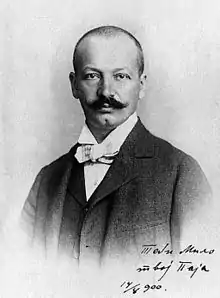 Paja Jovanović remains one of Serbia's most acclaimed painters.
Paja Jovanović remains one of Serbia's most acclaimed painters.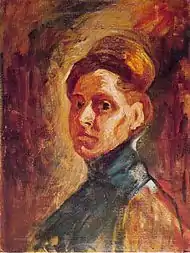 Nadežda Petrović was a noted painter and photography pioneer.
Nadežda Petrović was a noted painter and photography pioneer.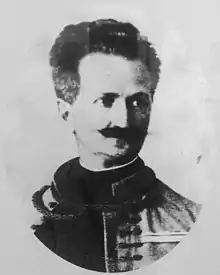 Momir Korunović was the leading architect of unique Serbo-Byzantine Revival architectural school.
Momir Korunović was the leading architect of unique Serbo-Byzantine Revival architectural school. Petar Lubarda was an internationally acclaimed painter.
Petar Lubarda was an internationally acclaimed painter.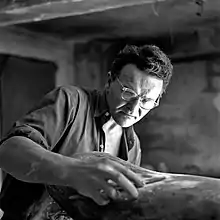 Vojin Bakić was a prominent sculptor in Yugoslavia.
Vojin Bakić was a prominent sculptor in Yugoslavia..jpg.webp) Marina Abramović is dubbed the "Godmather of performance art".
Marina Abramović is dubbed the "Godmather of performance art".
Musicians
Composers
- Kir Joakim (14th and early 15th century)
- Kir Stefan the Serb (14th and early 15th century)
- Nikola the Serb (14th and early 15th century)
- Isaiah the Serb (14th and early 15th century)
- Pajsije (1542–1647), the Serbian Patriarch from 1614 to 1647, he also composed chants
- Elena Pucić-Sorkočević (1786–1865) was the first female composer in the Republic of Ragusa, ethnic Serb
- Josip Runjanin, (1821–1878), Croatian and Serbian composer, ethnic Serb.[47]
- Kornelije Stanković[35][30] (1831–1865)
- Slavka Atanasijević (1850–1897), Serbian composer and pianist.
- Josif Marinković (1851–1923), one of the most important Serbian composers of the 19th century.
- Stevan Stojanović Mokranjac[30] (1856–1914)
- Jovo Ivanišević (1861–1889)
- Stanislav Binički[30] (1872–1942)
- Petar Krstić (1877–1957)
- Petar Stojanović (1877–1957)
- Isidor Bajić (1878–1918)
- Petar Konjović[30] (1883–1970)
- Miloje Milojević (1884–1946)
- Stevan Hristić (1885–1958)
- Rudolph Reti (1885–1957)
- Mihailo Vukdragović (1900–1967)
- Marko Tajčević (1900–1984)
- Ljubica Marić (1909–2003)
- Dragutin Gostuški (1923–1998)
- Vasilije Mokranjac (1923–1984)
- Dusan Trbojevic (1925–2011)
- Dejan Despić (1930)
- Voki Kostić (1931–2010)
- Zoran Sztevanovity (1942)
- Milan Mihajlović (1945)
- Zoran Simjanović (1946)
- Dušan Šestić (1946), composer of the National anthem of Bosnia and Herzegovina[48]
- Vojna Nešić (1947)
- Vladimir Tošić (1949)
- Zoran Erić (1950)
- Goran Bregović (1950), Bosnian and Serbian composer, Croat father and Serb mother
- Miloš Raičković (1956)
- Vladimir Graić (1967)
- Isidora Žebeljan[49] (1967–2020)
- Ana Sokolovic (1968), Serbian born Canadian music composer[50]
- Aleksandra Vrebalov (1970), Serbian born American composer and musician
- Aleksandar Kobac (1971)
- Kristina Kovač (1974)
- Jasna Veličković (1974)
Opera singers
- Radmila Bakočević (1933), spinto soprano
- Olivera Miljaković (1934)
- Milka Stojanović (1937)
- Radmila Smiljanić (1940), classical soprano who has had an active international career in operas and concerts since 1965. She is particularly known for her portrayals of heroines from the operas of Giuseppe Verdi and Giacomo Puccini.[51][52]
- Oliver Njego (1959), baritone, student of Bakočević, who also crossed over into popular music, eventually becoming a prominent opera singer.[53]
- Laura Pavlović, lyric and spinto soprano opera singer, and a soloist with the Serbian National Theatre Opera in Novi Sad.[54]
- Milena Kitic (1968), Serbian-born American mezzo-soprano[55]
- Željko Lučić (1968), Serbian operatic baritone[56]
- Suzana Šuvaković Savić (1969–2016)
- Nikola Mijailović (1973), baritone[57]
- David Bižić (1975), baritone[58]
Music performers
- Filip Višnjić (1767–1834), guslar[35][30]
- Djuro Milutinović the Blind (1774–1844), guslar[35]
- Petar Perunović-Perun (1880–1952), Montenegrin Serb, naturalized U.S., guslar
- Vlastimir Pavlović Carevac (1895–1965), Serbian violinist, conductor and founder and director of the National Orchestra of Radio Belgrade
- Mihailo Živanović (1928–1989), clarinetist, saxophonist and composer
- Milenko Stefanović (1930), classical and jazz clarinettist
- Duško Gojković (1931), jazz trumpetist and composer
- Del Casher (1938), American musician and inventor
- Muruga Booker (born Steven Bookvich, 1942), drummer, composer, recording artist[59]
- Brian Linehan (1944–2004), host-producer of TV's City Lights
- Bora Dugić (1945), flautist
- Lene Lovich (1949), New Wave singer, songwriter, musician
- Raša Đelmaš (1950), rock drummer
- Philippe Djokic (1950), professor of violin at Dalhousie University
- Radomir Mihailović Točak (1950), rock, jazz, blues guitarist
- Laza Ristovski (1956 – 2007), rock/jazz keyboard player
- Miroslav Tadić (1956), classical guitarist
- Milan Mladenović (1958–1994), singer, guitar player
- Uroš Dojčinović (1959), guitarist
- Dragomir Mihajlović (1960), guitarist
- Zoran Lesandrić (1961), rock musician
- Boban Marković (1964), acclaimed brass ensemble leader (Boban Marković Orchestra), won "Best Orchestra" at 40th Guča Sabor (2000). Soundtrack for Kusturica movies.
- Bojan Zulfikarpašić (1968), pianist
- Mike Dimkich (1968), Punk guitarist (The Cult & Bad Religion)
- Marina Arsenijevic (1970), concert pianist and composer[60]
- Ana Popović (1976), blues guitarist
- Stefan Milenković (1977), violin player
- Slobodan Trkulja (1977), multi-instrumentalist
- Kornelije Kovač (1978), rock keyboard player and composer
- Milaan (1979), accordionist
- Jasna Popovic (1979), pianist[61]
- Denise Djokic (1980), Canadian cellist
- Maja Bogdanović (1982), cellist
- Ivy Jenkins (born Ivana Vujic, 1983), metal bass player, fashion designer
- Nemanja Radulović (1985), violinist
- Jelena Mihailović (1987), cellist
- Marija Šestić (1987)
- David Maxim Micic (1990)
Singers
- Nada Mamula (1927–2001), traditional folk singer
- Đorđe Marjanović (1931)
- Bora Spužić Kvaka (1934–2002), singer
- Lola Novaković (1935–2016), pop singer
- Predrag Živković Tozovac (1936)[62]
- Arsen Dedić (1938–2015), chanson singer
- Toma Zdravković (1938–1991)[62]
- Lepa Lukić (born 1940), folk singer
- Boba Stefanović (1946–2015)
- Dušan Prelević (1948–2007, singer, journalist, and writer
- Miroslav Ilić (born 1950), folk singer
- Miloš Bojanić (born 1950), folk singer
- Šaban Šaulić (1951–2019), folk singer-songwriter
- Zdravko Čolić (1951), pop singer
- Bora Đorđević (1953), rock musician, member of Riblja Čorba
- Đorđe Balašević (1953), pop-rock musician
- Slađana Milošević (1955), rock musician
- Željko Samardžić (1955), pop singer
- Zorica Brunclik (1955), folk singer
- Vesna Zmijanac (1957), pop-folk singer
- Mitar Mirić (1957), folk singer
- Goran Šepa (1958), musician best known as the frontman of Kerber[63]
- Lepi Mića (1959), singer
- Ana Bekuta (1959)
- Snežana Đurišić (1959)
- Momčilo Bajagić "Bajaga" (1960), rock musician, member of Bajaga i Instruktori
- Bebi Dol (1962), pop, rock and jazz singer-songwriter
- Nele Karajlić (1962), rock musician, member of Zabranjeno Pušenje
- Baja Mali Knindža (1966), singer
- Aca Lukas (1968), pop-folk musician
- Dragana Mirković (1968), pop-folk singer
- Divna Ljubojević (1970), singer
- Svetlana Spajić (1971), world music singer-songwriter
- Aleksandra Kovač (1972), pop and R&B singer-songwriter, member of K2
- Željko Joksimović (1972), pop singer, 2nd place at Eurovision 2004, and 3rd place at Eurovision 2012
- Aco Pejović (1972)
- Ceca (1973), pop-folk singer
- Dalibor Andonov Gru (1973–2019), rapper
- Aleksandra Radović (1974), pop and R&B singer
- Viki Miljković (1974)
- Goca Tržan (1974), Europop singer, member of Tap 011
- Kristina Kovač (1974), pop and R&B singer-songwriter, member of K2
- Vlado Georgiev (1976), pop-rock musician
- Jelena Karleuša (1978), pop singer
- Nataša Bekvalac (1980), pop singer
- Saša Matić (1978), pop-folk musician
- Seka Aleksić (1981), pop-folk singer
- Marija Šerifović (1984), pop singer, winner of the Eurovision 2007
- Bojana Vunturišević (1985), singer-songwriter
- Milan Stanković (1987), pop singer
- Stefan Đurić Rasta (1989), rapper
- Danica Crnogorčević (1993), religious songs singer
- Barbara Pravi (1993), French singer
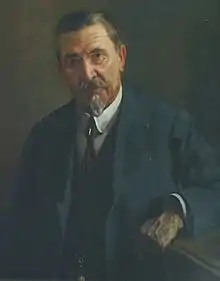 Composer and educator Stevan Mokranjac is considered the "father of Serbian music."
Composer and educator Stevan Mokranjac is considered the "father of Serbian music." Stevan Hristić was a noted Serbian and Yugoslav composer.
Stevan Hristić was a noted Serbian and Yugoslav composer.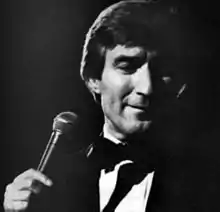 Toma Zdravković remains an iconic folk singer and bohemian figure.
Toma Zdravković remains an iconic folk singer and bohemian figure.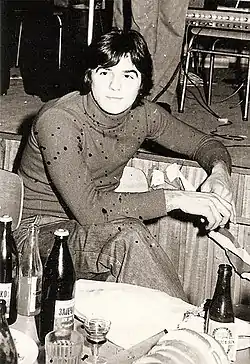 Zdravko Čolić is widely considered as one of the greatest vocalists and cultural icons of former Yugoslavia
Zdravko Čolić is widely considered as one of the greatest vocalists and cultural icons of former Yugoslavia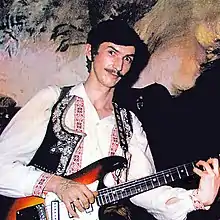 Radomir Mihailović Točak is a noted rock guitarist and a member of Smak.
Radomir Mihailović Točak is a noted rock guitarist and a member of Smak. Đorđe Balašević is a notable Serbian singer-songwriter.
Đorđe Balašević is a notable Serbian singer-songwriter.
Actors
- Milorad Petrović (1865–1928)
- Dobrica Milutinović (1880–1956)
- Žanka Stokić[30] (1887–1947)
- Iván Petrovich (1894–1962) German actor of Serbian origin, silent screen star
- Nevenka Urbanova (1909–2007), actress
- Gloria Grey (1909–1947), American silent film star
- Rahela Ferari[30] (1911–1994)
- Karl Malden (1912–2009),[64] Academy award-winning actor
- John Vivyan (1915–1983), born as John R. Vukayan; film, stage and television actor ("Mr. Lucky", a popular CBS adventure series), also a highly decorated veteran
- Brad Dexter (1917–2002), actor in Hollywood classics[65]
- Rade Marković (1921–2010)
- Mija Aleksić (1923–1995)
- Mira Stupica (1923–2016)
- Mihajlo Bata Paskaljević (1923–2004)
- Miodrag Petrović Čkalja[30] (1924–2003)
- Olivera Marković (1925–2011), actress
- Radmila Savićević (1926–2001)
- Branko Pleša (1926–2001)
- Pavle Vujisić (1926–1988)
- Stevo Žigon (1926–2005)
- Pavle Vujisić[30] (1926–1988)
- Živojin Milenković (1928–2008)
- Ljuba Tadić (1929–2005)
- Vlastimir Đuza Stojiljković (1929–2015)
- Mira Banjac (1929)
- Renata Ulmanski (1929)
- Stevan Šalajić (1929–2002)
- Bora Todorović (1929–2014)
- Nadja Regin (1931–2019), Serbian actress, part of the crew of From Russia with Love[66]
- Đoko Rosić (1932–2014)
- Dragomir Gidra Bojanić (1933–1993)
- Velimir Bata Živojinović (1933–2016)
- Jelena Žigon (1933–2018)
- Danilo Stojković[30] (1934–2002)
- Taško Načić, (1934–1993)
- Ružica Sokić (1934–2013)
- Slobodan Aligrudić (1934–1985)
- Nikola Simić (1934–2014)
- Milena Vukotic (1935), Italian film actress
- Ljubiša Samardžić (1936–2017)
- Rada Rassimov (1938),[67] Italian actress, best known for her role in The Good, the Bad and the Ugly
- Ivan Rassimov (1938–2003)
- Vera Čukić (1938)
- Mihailo Janketić (1938–2019)
- Zoran Bečić (1939–2006)
- Gojko Mitić (1940)
- Olivera Katarina (1940)
- Milena Dravić (1940–2018)
- Petar Kralj (1941–2011)
- Mel Novak (1942)
- Seka Sablić (1942)
- Beba Lončar (1943), Serbian-Italian film actress
- Dragan Nikolić (1943–2016)
- Boro Stjepanović (1946)
- Predrag Ejdus (1947–2018)
- Josif Tatić (1946–2013)
- Marko Nikolić (1946–2019)
- Milan Gutović (1946)
- Petar Božović (1946)
- Branko Cvejić (1946)
- Svetlana Bojković (1947)
- Vojislav Brajović (1949)
- Miki Manojlović (1950), Yugoslav and Serbian actor, star of some of the most important films in Yugoslav cinema, president of the Serbian Film Center since 2009
- Natalia Nogulich (1950), American actress (Performed in Star Trek: The Next Generation)
- Aleksandar Berček (1950)
- Danilo Lazović (1951–2006)
- Lazar Ristovski (1952), actor and director
- Gorica Popović (1952)
- Predrag Miletić (1952)
- Bogdan Diklić (1953)
- Radmila Živković (1953)
- Radoš Bajić (1953)
- Neda Arnerić (1953–2020)
- Vesna Čipčić (1954)
- Jelica Sretenović (1954)
- Zlata Petković (1954–2012)
- Ljiljana Blagojević (1955)
- Milenko Zablaćanski (1955–2008)
- Branislav Lečić (1955)
- Mirjana Karanović (1957)
- Olga Odanović (1958)
- Zoran Cvijanović (1958)
- Branimir Brstina (1960)
- Žarko Laušević (1960)
- Lolita Davidovich (1961), American actress, True Detective
- Catharine Oxenberg (1961), American TV actress (Serbian mother Princess Elisabeth of Yugoslavia)
- Sonja Savić (1961–2008)
- Milorad Mandić (1961–2016)
- Predrag Bjelac (1962)
- Slavko Labović (1962)
- Anica Dobra (1963), Serbian actress, who won Bavarian Film Awards "Best Young Actress" for Rosamunde, cast in German Love Scenes from Planet Earth
- Dragan Bjelogrlić (1963)
- Srđan Žika Todorović (1965)
- Vesna Trivalić (1965)
- Dejan Čukić (1966)
- Nikola Kojo (1967)
- Anita Mančić (1968)
- Dubravka Mijatović (1968)
- Nebojša Glogovac (1969–2018)
- Dragan Mićanović (1970)
- Branka Katić (1970)
- Branka Katić (1970)
- Goran Kostić (1971)
- Vojin Ćetković (1971)
- Nenad Jezdić (1972)
- Nataša Ninković (1972)
- Katarina Žutić (1972)
- Sergej Trifunović (1972)
- Sasha Alexander (1973), Hollywood actress (Dawson's Creek, Rizzoli and Isles), daughter-in-law of Sophia Loren
- Adrienne Janic (1974)
- Nikola Đuričko (1974)
- Miloš Samolov (1974)
- Milla Jovovich (1975)[68]
- Stana Katić (1978), Canadian born Hollywood actress, featured in TV series Castle
- Milena Govich (1976),[69] Serbian American actress of TV series Law & Order
- Ben Mulroney (1976)
- Ursula Yovich (1977),[70] Australian actress of Serbian-Aboriginal origin[71]
- Gordan Kičić (1977)
- Branko Tomović (1980)
- Sonja Kolačarić (1980)
- Sarah Sokolovic (1980)
- Sloboda Mićalović (1981)
- Marija Karan (1982)
- Petar Benčina (1984), actor[72][73]
- Danica Curcic (1985), Danish actress, Serbian parentage
- Miloš Biković (1988)
- Nataša Petrović (1988)
- Jelisaveta Orašanin (1988)
- Mirka Vasiljević (1992)
Film/TV directors and screenwriters
- Svetozar Botorić (1857–1916), owner of Serbia's first movie theatre, the Paris Cinema[74]
- Slavko Vorkapić (1894–1976), director and editor
- Aleksandar Petrović (1929–1994), film director[30]
- Dušan Makavejev (1932–2019), film director and screenwriter.
- Đorđe Kadijević (1933), film and TV director
- Boro Drašković (1935), director
- Gordan Mihić (1938–2019)
- Peter Bogdanovich (1939), director
- Gojko Mitić (1940), director
- Steve Tesich (1942–1996), Oscar-winning screenwriter and playwright
- Želimir Žilnik (1942), director, Golden Bear winner at the Berlin International Film Festival
- Slobodan Pavićević (1945), film and TV production manager and producer
- Slobodan Šijan (1946), director
- Goran Paskaljević (1947), director
- Dušan Kovačević (1948), director and writer
- Božidar Zečević (1948), film historian and critic
- Nebojša Pajkić (1951)
- Emir Kusturica (1954), filmmaker, actor, writer and musician
- Predrag Bambić (1958), film and television cinematographer and producer
- Dragoslav Bokan (1961)
- Goran Gajić (1962), director
- Srđan Dragojević (1963), director
- Ivan Šijak (1969), director
- Sven Stojanovic (1969), Swedish TV director
- Đorđe Milosavljević[75][76] (1969)
- Srdan Golubović (1972), director
- Stefan Arsenijević (1977), director, Golden Bear winner at the Berlin International Film Festival[77]
- Michael Jelenic (1977)
- Mila Turajlić (1979), documentary filmmaker
- Boris Malagurski (1988), documentary filmmaker
- Dušan Lazarević
Designers
- Jelena Patrnogic (1932–2010), costume designer
- Zoran Ladicorbic (1947), Serbian-born American fashion designer
- Verica Rakocević (1948), fashion designer[78]
- Miljen Kljaković (1950), award-winning production designer
- Sacha Lakic (1964), Serbian-born French automotive and furniture designer[79]
- Konstantin Grcic (1965), industrial designer
- Jelena Behrend (1968), Serbian-born American jewelry designer
- Marek Djordjevic (1969), automobile designer[80]
- Marijana Matthäus (1971), Serbian fashion designer
- Elena Karaman Karić (1971), interior designer, furniture designer
- Aleksandar Protić (1973), fashion designer
- Ana Šekularac (1974), British fashion designer of Serbian descent[81][82]
- Boris Nikolić (1974–2008), fashion designer
- Roksanda Ilincic (1975), Serbian-born British fashion designer
- Zvonko Marković (1975), fashion designer
- Gorjana Reidel (1978), Serbian-born American jewelry designer
- Ivana Sert (1979), swimsuit designer, television presenter, model
- Bojana Sentaler, Serbian-born Canadian fashion designer
- Bata Spasojević, fashion designer
- Ines Janković (1983), fashion designer
- Ana Kras (1984), Serbian-born American fashion and furniture designer, photographer
- Ana Ljubinković (1985), fashion designer[83][84]
- Mihailo Anušić (1985), fashion designer
- Sonja Jocić (1988), fashion designer
- Nevena Ivanović (1992), fashion designer[85]
- George Styler, Serbian-born American fashion designer
- Rushka Bergman, Serbian-born American fashion stylist and editor
- Jovan Jelovac, founder and director of Belgrade Design Week
- Ivana Pilja, fashion designer[86][84]
- Ana Rajcevic, fashion artist[87]
- Aleksandra Lalić, fashion designer[88]
- Evica Milovanov-Penezic, glove designer[89]
Models
- Zlata Petković (1954–2012)
- Aleksandra Melnichenko (born 1977), Serbian model and pop group member, wife of Andrey Melnichenko
- Nataša Vojnović (born 1979), Serbian fashion model
- Maja Latinović (born 1980), Serbian fashion model
- Dragana Atlija (1983), model and actress
- Sanja Papić (1984), Miss Serbia and Montenegro at the Miss Universe 2002
- Sara Brajovic (1985)[90] French fashion model
- Tijana Arnautović (1986), Miss World Canada[91]
- Ana Mihajlović (1987), Serbian fashion model
- Vedrana Grbović (1987), model and beauty pageant winner
- Danijela Dimitrovska (1987), Serbian fashion model
- Georgina Stojiljković (1988), Serbian fashion model
- Olya Ivanisevic (1988), Serbian fashion model
- Aleksandra Nikolić (1990), Serbian fashion model
- Mila Miletic (1991), Serbian fashion model
- Sofija Milošević (1991), Serbian fashion model
- Andreja Pejic (1991), Australian fashion model
- Veruska Ljubisavljević (1991), Miss Venezuela 2018
- Anđelka Tomašević (1993), model and beauty pageant winner
- Sara Mitić (1995), model and beauty pageant winner
Dancers and choreographers
- Olgivanna Lloyd Wright (1898–1985), granddaughter of Marko Miljanov and wife of Frank Lloyd Wright
- Nick Kosovich (1909–1947), ballroom dancer and actor
- George Zoritch (1917–2009), Russian dancer and teacher of Serbian antecedents
- Milorad Mišković (born 1928), ballet dancer and choreographer, honorary president of UNESCO International Dance Council
- Jelena Tinska (1953), actress and ballerina
- Tamara Martinović, ballet dancer
 Karl Malden (born: Mladen Sekulović) won an Academy-Award and a number of other awards.
Karl Malden (born: Mladen Sekulović) won an Academy-Award and a number of other awards. Pavle Vuisić is one of the most recognizable faces of Yugoslav cinema.
Pavle Vuisić is one of the most recognizable faces of Yugoslav cinema. Bata Živojinović acted in more than 340 films and TV series, and is regarded as one of the best actors in former Yugoslavia.
Bata Živojinović acted in more than 340 films and TV series, and is regarded as one of the best actors in former Yugoslavia. Milena Dravić was a well-know actress who won Cannes Film Festival Award for Best Actress.
Milena Dravić was a well-know actress who won Cannes Film Festival Award for Best Actress..jpg.webp) Miki Manojlović starred in many European films.
Miki Manojlović starred in many European films. Emir Kusturica won Palme d'Or twice.
Emir Kusturica won Palme d'Or twice.
Writers
- Buća, noble family, originating in Kotor during the Middle Ages. Some of their antecedents were writers and poets.
- Miroslav of Hum, 12th-century Great Prince (Велики Жупан) of Zachlumia from 1162 to 1190, an administrative division (appanage) of the medieval Serbian Principality (Rascia) covering Herzegovina and southern Dalmatia.
- Anonymous author of the Chronicle of the Priest of Duklja, a 12th-century literary work, preserved in its Latin version only, has all the indication that it was written in Old Slavic, or, at least, that a portion of the material included in it existed previously in the Slavic language.
- Stefan Nemanja (1113–1199), issued an edict called the "Hilandar Charter" for the newly established Serbian monastery at Mount Athos.[30]
- Stefan the First-Crowned (1165–1228), wrote "The Life of Stefan Nemanja", a biography of his father.[30]
- Saint Sava (1174–1236), Serbian royalty and Archbishop, author of oldest known Serbian constitution – the Zakonopravilo . Also, he authored Karyes Typikon in 1199 and Studenica Typikon in 1208.[30]
- Monk Simeon (c. 1170–1230), wrote Vukan's Gospel.
- Atanasije (scribe) (c. 1200–1265), a disciple of Saint Sava, was a Serbian monk-scribe who wrote a "Hymn to Saint Sava" and a "Eulogy to Saint Sava".
- Grigorije the Pupil, author of Miroslav Gospel and Miroslav of Hum commissioned it.
- Domentijan (c. 1210–died after 1264), Serbian scholar and writer. For most of his life, he was a monk dedicated to writing biographies of clerics, including "Life of St. Sava."
- Bratko Menaion, represents the oldest Serbian transcription of this liturgical book, discovered in the village of Banvani, and written by presbyter Bratko during the reign of king Stefan Vladislav I of Serbia in 1234.
- Stefan Uroš I of Serbia (1223–1277), author of the Ston Charter (1253).
- Theodosius the Hilandarian (1246–1328), technically the first Serbian novelist, wrote biographies of Saint Sava and St. Simeon
- Grigorije II of Ras (1250–1321), monk-scribe
- Nikodim I (c. 1250–1325), Abbot of Hilandar (later Serbian Archbishop), issued an edict (gramma) wherein he grants to the monks of the Kelion of St. Sava in Karyes a piece of land and an abandoned monastery. He translated numerous ancient texts and wrote some poetry. Also, he wrote Rodoslov (The Lives of Serbian Kings and Bishops).
- Dragolj Code, written in 1259 by Serbian monk Dragolj.
- Stanislav of Lesnovo (c. 1280–1350), wrote "Oliver's Menologion" in Serbia in 1342.
- Jakov of Serres (1300–1365), author of Triodion.
- Elder Grigorije (fl. 1310–1355), Serbian nobleman and monk, possibly "Danilo's pupil" (Danilov učenik), i.e. the main author of "Žitija kraljeva i arhiepiskopa srpskih".
- Isaija the Monk (14th century), translated the works of Pseudo-Dionysius the Areopagite.
- Anonymous Athonite (also known in Serbia as Nepoznati Svetogorac; late 14th to mid-15th century) was Isaija the Monk's biographer and one of the many unidentified authors of Medieval works.
- Elder Siluan (14th century), author of a hymn to Saint Sava. Hesychasm left a strong imprint in Serbian medieval literature and art, which is evident in works by Domentijan and Teodosije the Hilandarian, but most prominently in the writings of Danilo of Peć, Isaija the Monk and Elder Siluan.
- Stefan Dušan (1308–1355), author of Dušan's Code, the second oldest preserved constitution of Serbia.[30]
- Jefimija (1310–1405), daughter of Caesar Vojihna and widow of Jovan Uglješa Mrnjavčević, took monastic vows and is the author of three found works, including "Praise to Prince Lazar". One of the earliest European female writers.[30]
- Jefrem (patriarch) (c. 1312–1400), born in a priestly family, of Bulgarian origin, was the Patriarch of the Serbian Orthodox Church, from 1375 to 1379 and from 1389 to 1392. He was also a poet who left a large body of work, preserved in a 14th-century manuscript from Hilandar Monastery.
- Dorotej of Hilandar, wrote a charter for the monastery of Drenča in 1382.
- Rajčin Sudić (1335–after 1360), Serbian monk-scribe who lived during the time of Lord Vojihna, the father of Jefimija.
- Cyprian, Metropolitan of Moscow (1336–1406), Bulgarian-born, Serbian clergyman who as the Metropolitan of Moscow wrote The Book of Degrees (Stepénnaya kniga), which grouped Russian monarchs in the order of their generations. The book was published in 1563.
- Saint Danilo II, wrote biographies of Serbian medieval rulers, including the biography of Jelena, the wife of King Stefan Dragutin.
- Antonije Bagaš, translated works from Greek into Serbian.
- Euthymius of Tarnovo, founder of the Tarnovo Literary School that standardized the literary texts of all Orthodox Slavs, including those in Serbia and in Kievan Rus (Ukraine, Belarus, and Russia).
- Nikola Radonja (c. 1330–1399), as monk Gerasim, served and helped with great merit Hilandar and other monasteries at Mount Athos, and authored "Gerasim Chronicle" (Gerasimov letopis).
- Princess Milica (1335–1405), consort of Prince Lazar. One of the earliest European female writers.
- Psalter of Branko Mladenović, dated 1346.
- Vrhobreznica Chronicle, also written between 1350 and 1400 by an anonymous monk-scribe.
- Jefrem (patriarch), twice Serbian patriarch, though Bulgarian born. He was also a poet.
- Maria Angelina Doukaina Palaiologina (1350–1394), Serbian writer.
- Gregory Tsamblak (fl. 1409–1420), Bulgarian writer and cleric, abbot of Serbia's Visoki Dečani, wrote A Biography of and Service to St. Stephen Uroš III Dečanski of Serbia, and On the Transfer of Relics of Saint Paraskeva to Serbia.
- Danilo III, Patriarch of the Serbs (c. 1350–1400), Serbian patriarch and writer. He wrote Slovo o knezu Lazaru (Narrative About Prince Lazar).
- Nikola Stanjević (fl. 1355), commissioned monk Feoktist to write Tetravangelion at the Hilandar monastery, now on exhibit at the British Museum in London, collection No. 154.
- Jelena Balšić (1366–1443), educated Serbian noblewoman, who wrote the Gorički zbornik, correspondence between her and Nikon of Jerusalem, a monk in Gorica monastery (Jelena's monastic foundation) on Beška (Island) in Zeta under the Balšići.
- Stefan Lazarević(1374–1427), Knez/Despot of Serbia (1389–1427), wrote biographies and poetry, one of the most important Serbian medieval writers. He founded the Resava School at Manasija monastery.[30]
- Đurađ Branković (1377–1456), author psalter Oktoih, published posthumously in 1494 by Hieromonk Makarije, the founder of Serbian and Romanian printing.
- Kir Joakim, late 14th century musical writer.
- Dečani Chronicle, written by an anonymous monk, also from the Resava School made famous by Manasija monastery. Rewritten and published in 1864 by Archimandrite Serafim Ristić of the Dečani Monastery
- Oxford Serbian Psalter, written by an anonymous monk-scribe.
- Munich Serbian Psalter, written by an anonymous monk-scribe.
- Tomić Psalter, named after Simon Tomić, a Serbian art collector, found the 14th century illuminated manuscript in Old Serbia in 1901.
- Dorotheus of Hilandar, author of a charter for the monastery of Drenča (1382).
- Romylos of Vidin, also known as Romylos of Ravanica where he died in the late 1300s.
- Kir Stefan the Serb (late 14th and early 15th century), Serbian monk-scribe and composer.
- Nikola the Serb (late 14th and early 15th century), Serbian monk-scribe and composer.
- Isaiah the Serb, monk-scribe and composer of chants in the 15th century. He finished the translation from Greek to Serbian of the Corpus Areopagiticum, the works of Pseudo-Dionysius the Areopagite, in 1371, and transcribed the manuscripts of Joachim, Domestikos of Serbia.
- Danilo III (patriarch), writer and poet.
- Constantine of Kostenets (fl. 1380–1431), Bulgarian writer and chronicler who lived in Serbia, author of the biography of Despot Stefan Lazarević and of the first Serbian philological study, Skazanije o pismenah (A History on the Letters).
- Kantakuzina Katarina Branković (1418/19–1492), remembered for commissioning the Varaždin Apostol in 1454.
- Radoslav Gospels, work of both Celibate Priest Feodor, also known as "Inok from Dalsa" (fl. 1428–1429), who is credited for transcribing the Radoslav Gospel (Tetraevangelion) in the Serbian recension, now in the National Library of Russia in St. Petersburg. Radoslav is the famed miniaturist who illuminated the pages.
- Jelena Balšić's correspondence with monk Nikon of Jerusalem between 1441 and 1442 is found in Gorički zbornik, named after the island of Gorica in Lake Skadar where Jelena built a church.
- Dimitrije Kantakuzin, while residing in the Rila monastery in 1469 Kantakuzin wrote a biography of Saint John of Rila and a touching "Prayer to the Holy Virgin" imploring her aid in combating sin.
- Konstantin Mihailović (c. 1430–1501), the last years of his life were spent in Poland where he wrote his Turkish Chronicle, an interesting document with a detailed description of the historical events of that period as well as various customs of the Turks and Christians.
- Pachomius the Serb (Paxomij Logofet), prolific hagiographer who came from Mount Athos to work in Russia between 1429 and 1484. He wrote eleven saint's lives (zhitie) while employed by the Russian Orthodox Church in Novgorod. He was one of the representatives of the ornamental style known as pletenje slova (word-braiding).
- Dimitar of Kratovo, 15th-century Serb writer and lexicographer of the Kratovo Literary School.
- Ninac Vukoslavić (fl. 1450–1459), chancellor and scribe at the court of Scanderbeg, and author of his letters.
- Deacon Damian who wrote "Koporin Chronicle" in 1453.
- Vladislav the Grammarian (fl. 1456–1483), Serbian monk, writer, historian and theologian.
- Dimitar of Kratovo was a 15th-century Serb writer and lexicographer, one of the most important members of the Kratovo literary school.
- Martin Segon was a Serbian writer, Catholic Bishop of Ulcinj and a 15th-century humanist.
- Lazar of Hilandar After Pachomius the Serb, the most significant Serbian monk in Imperial Russia.
- Benedikt Kuripečič (1491–1531) was the first to record part of the folk songs of the Battle of Kosovo dealing with Miloš Obilić's exploits.
- Stefan Paštrović (fl. 1560–1599), author of two books, engaged a certain hieromonk Sava of Visoki Dečani to print them in Venice at the Francesco Rampazetto and Heirs publishing house in 1597.
- Jakov of Kamena Reka (fl. 1564–1572), worked in the Vuković printing house in Venice with Vićenco Vuković, son of Božidar.
- Radiša Dimitrović owned the Belgrade printing house where many medieval works were published.
- Peja (priest) wrote a poem In the Court and in the Dungeon, from The Service of Saint George of Kratovo, and a biography of the same saint between 1515 and 1523.
- Teodor Ljubavić wrote the Goražde Psalter in 1521.
- Tronoša Chronicle was written in 1526 and transcribed by hieromonk Josif Tronoša in the eighteenth century.
- Jovan Maleševac was a Serbian Orthodox monk and scribe who collaborated in 1561 with the Slovene Protestant reformer Primož Trubar to print religious books in Cyrillic.
- Matija Popović was a 16th-century Serbian Orthodox cleric from Ottoman Bosnia who also supported the Reformation movement.
- Peter Petrovics was a 16th-century Serbian magnate and one of Hungary's most influential and fervent supporters of the Reformation.
- Teodor Račanin (Bajina Bašta, c. 1500–Bajina Bašta, past-1560) was the first Serbian writer and monk of the Rachan Scriptorium School mentioned in Ottoman and Serbian sources.
- Dimitrije Ljubavić (1519–1563) was a Serbian Orthodox deacon, humanist, writer, and printer who sought to bring a rapprochement between the Lutherans and the Eastern Orthodox Church.
- Jovan the Serb of Kratovo (1526–1583) was a Serbian writer and monk whose name is preserved as the author of six books, now part of the Museum Collection of the Serbian Orthodox Church.
- Inok Sava (c. 1530–after 1597) was the first to write and publish a Serbian Primer (syllabary) at the printing press of Giovanni Antonio Rampazetto in Venice in two editions, first on the 20th and the second on the 25th of May 1597, after which the book somehow fell into neglect only to be rediscovered recently.
- Pajsije I Janjevac (1542–1649) was a Serbian Patriarch and an author whose works showed an admixture of popular elements.
- Georgije Mitrofanović (c.1550–1630) was a Serbian Orthodox monk and painter whose work can be seen in the church at the Morača monastery.
- Mavro Orbin (1563–1614) was the author of the "Realm of the Slavs" (1601) which made a significant impact on Serbian historiography, influencing future historians, particularly Đorđe Branković (count).
- Zograf Longin (16th century), was an icon painter and writer.
- Jakov of Kamena Reka worked in the Vuković printing house in Venice with Vićenco Vuković.
- Mariano Bolizza (fl. 1614) was a prominent Serbian writer who also wrote in Italian.
- Đorđe Branković, Count of Podgorica (1645–1711) who wrote the first history of Serbia in five volumes.
- Radul of Riđani (fl. 1650–1666) was a Serbian Orthodox priest and chieftain of Riđani, and a prolific letter writer who kept the authorities of Perast informed about Ottoman preparations for the Battle of Perast. A collection of his letters are kept in a museum.
- Kiprijan Račanin (c. 1650–1730) was a Serbian writer and monk who founded a copyist school in Szentendre in Hungary, like the one he left behind at the Rača monastery in Serbia at the beginning of the Great Turkish War in 1689.
- Jerotej Račanin (c. 1650–after 1727) was a Serbian writer and copyist of church manuscripts and books. After visiting Jerusalem in 1704 he wrote a book about his travel experiences from Hungary to the Holy Land and back.
- John of Tobolsk (1651–1715) was a Serbian cleric born in Nizhyn, in the Czernihow Voivodeship of the Polish–Lithuanian Commonwealth of the time, now revered as a saint.
- Čirjak Račanin (Bajina Bašta, c. 1660 – Szentendre, 1731) was a Serbian writer and monk, a member of the famed "School of Rača".
- Tripo Kokolja (1661–1713) was a well-known Serbian-Venetian painter.
- Sava Vladislavich (1669–1738), framed Peter the Great's proclamation of 1711, translated Mavro Orbin's Il regno de gli Slavi (1601); The Realm of the Slavs) from Italian into Russian, and composed the Treaty of Kiakhta and many others
- Gavril Stefanović Venclović (fl. Bajina Bašta, 1670 – Szentendre, 1749), one of the first and most notable representatives of Serbian Baroque and Enlightenment literature, wrote in the vernacular. Milorad Pavić saw Venclović as a living link between the Byzantine literary tradition and the emerging new views on modern literature. He was the precursor of enlightenment aiming, most of all, to educate the common folk.
- Julije Balović (1672–1727) wrote in Italian and Serbian. He is the author of Practichae Schrivaneschae, a manual for a ship's scribe, and Perast Chronicles, a collection of epic poetry.
- Ivan Krušala (1675–1735) is best known for writing a poem about the Battle of Perast in 1654, among others. He worked in a Russian embassy in China at the time when Sava Vladislavich was the ambassador.
- Simeon Končarević (c. 1690–1769), a Serbian writer and Bishop of Dalmatia who, exiled twice from his homeland, settled in Russia where he wrote his chronicles.
- Parteniy Pavlovich (c. 1695–1760) was a Serbian Orthodox Church cleric who championed South Slavic revival.
- Danilo I, Metropolitan of Cetinje (1697–1735) was a writer and founder of the Petrović Njegoš dynasty.
- Sava Petrović (1702–1782) wrote numerous letters to the Moscow metropolitan and the Empress Elizabeth of Russia about the deploring conditions of the Serb Nation under occupation by the Turks, Republic of Venice and the Habsburg Empire.
- Pavle Nenadović (1703–1768) was commissioned by Serbian Orthodox Metropolitan of Karlovci, Arsenije IV Jovanović Šakabenta to compose a heraldic book, Stemmatographia.
- Jovan Četirević Grabovan (1720–1781) was a Serbian icon painter. He painted the Lepavina and Orahovica monasteries, among others.
- Tomo Medin (1725–1788) was a Montenegrin Serb writer and adventurer. He and Casanova had two duels together.
- Zaharije Orfelin (1726–1785), one of the most notable representatives of the Serbian Baroque in art and literature[92]
- Jovan Rajić (1726–1801), writer, historian, traveler, and pedagogue, who wrote the first systematic work on the history of Croats and Serbs[92]
- Mojsije Putnik (1728–1790), Metropolitan, educator, writer, and founder of secondary schools and institutions of higher learning.
- Kiril Zhivkovich (1730–1807) was a Serbian and Bulgarian writer.
- Pavle Julinac (1730–1785) was a Serbian writer, historian, traveler, soldier, and diplomat.
- Simeon Piščević (1731–1797), was a Serbian writer and high-ranking officer in the service of Austria and Imperial Russia.
- Dositej Obradović (1739–1811), influential protagonist of the Serbian national and cultural renaissance, founder of modern Serbian literature[35][30]
- Nikola Nešković (1740–1789) was a most prolific Serbian icon, fresco and portrait painter in the Baroque style.
- Stefan von Novaković (c. 1740–1826) was a Serbian writer and publisher of Serbian books in Vienna and patron of Serbian literature.
- Teodor Janković-Mirijevski (1740–1814), the most influential educational reformer in the Habsburg Empire and Imperial Russia
- Jovan Muškatirović (1743–1809) was one of the early disciples of Dositej Obradović.
- Teodor Ilić Češljar (1746–1793) was one of the best late Baroque Serbian painters from the region of Vojvodina.
- Petar I Petrović Njegoš (1748–1830) was a writer and poet besides being a spiritual and temporal ruler of the "Serb land of Montenegro" as he called it.
- Vićentije Rakić (1750–1818) was a Serbian writer and poet. He founded the School of Theology (now part of the University of Belgrade).
- Stefano Zannowich (1751–1786) was a Montenegrin Serb writer and adventurer. From his early youth, he was prone to challenges and adventures, unruly and dissipated life. He wrote in Italian and French, besides Serbian. He is known for his "Turkish Letters" that fascinated his contemporaries. His works belong to the genre of epistolary novel.
- Hadži-Ruvim (1752–1804) was a Serbian Orthodox archimandrite who documented events and wars in his time, established a private library, wrote library bibliographies, collected books in which he drew ornaments and miniatures. He did wood carving and woodcutting.
- Gerasim Zelić (1752–1828), Serbian Orthodox Church archimandrite, traveller and writer (compatriot of Dositej). His chief work was the travel memoirs Žitije (Lives), which also served as a sociological work.[35]
- Tripo Smeća (1755–1812) was a Venetian historian and writer who wrote in Italian and in Serbian.
- Avram Mrazović (1756–1826) was a Serbian writer, translator and pedagogue.
- Emanuilo Janković (1758–1792) was a Serbian man of letters and of science.
- Sava Tekelija (1761–1842) was the patron of Matica Srpska, a literary and cultural society[30]
- Gligorije Trlajić (1766–1811), writer, poet, polyglot and professor of law at the universities of St. Petersburg and Kharkiv (Harkov), author of a textbook on Civil Law which according to some laid the foundations of Russian civil law doctrine
- Old Rashko (1770–18??), Romanticism
- Tomo Milinović (1770–1846) is a Serbian writer and freedom-fighter. He authored two books, Umotvorina (published posthumously 1847) and Istorija Slavenskog Primorija (lost and never published).
- Jovan Pačić (1771–1848) was a Serbian poet, writer, translator, painter and soldier. He translated Goethe
- Pavel Đurković (1772–1830) was one of the most important Serbian Baroque artists (writers, icon painters, goldsmiths, woodcarvers).
- Joakim Vujić, (1772–1847), writer, dramatist, actor, traveler and polyglot. He is known as the Father of Serbian Theatre.[93][35]
- Atanasije Stojković (1773–1832) was a Serbian writer, pedagogue, physicist, mathematician and astronomer in the service of Imperial Russia. He also taught mathematics at the university of Kharkiv.
- Živana Antonijević (1770s–1828), Romanticism
- Lukijan Mušicki (1777–1837), Serbian Orthodox abbott, poet, prose writer, and polyglot.[35]
- Matija Nenadović (1777–1854) author of Memoirs, an eyewitness account of the First Serbian Uprising in 1804 and the Second Serbian Uprising in 1815.[35]
- Teodor Filipović (1778–1807), writer, jurist and educator, wrote the Decree of the Governing Council of Revolutionary Serbia. He taught at the newly founded National University of Kharkiv, with his compatriots, Gligorije Trlajić and Atanasije Stojković.
- Stevan Živković-Telemak (1780–1831) is the author of Obnovljene Srbije, 1780-1831 (Serbie nouvelle, 1780–1731) and Serbian translator of François Fénelon's Les Aventures de Telemaque.
- Jovan Došenović (1781–1813) was a Serbian philosopher, poet and translator.
- Sava Mrkalj (1783–1833), devised an alphabet system, which rejected 16 of 42 Slavonic letters.
- Luka Milovanov Georgijević (1784–1828) is considered the first children's poet of new Serbian literature. He collaborated with Vuk Karadžić on the production of grammars and the dictionary.
- Vuk Stefanović Karadžić (1787–1864), Romanticism[35][30]
- Sofronije Jugović-Marković (fl. 1789) was a Serbian writer and activist in Russian service. He wrote "Serbian Empire and State" in 1792 in order to raise the patriotic spirit of the Serbs in both the Habsburg and Ottoman empires.
- Dimitrije Davidović (1789–1838), Minister of Education of the Principality of Serbia, writer, journalist, publisher, historian, diplomatist, and founder of modern Serbian journalism and publishing.[35]
- Sima Milutinović Sarajlija (1791–1847), poet, hajduk, translator, historian, philologist, diplomat and adventurer.[35] [30]
- Georgije Magarašević (1793–1830), eminent writer, historian, dramatist, publisher, and founder and first editor of Serbski Letopis.
- Jovan Hadžić (1799–1869) was a Serbian writer and legislator
- Prokopije Čokorilo (1802–1866) is known for his chronicles and a dictionary of Turkish expressions in Serbian. He contributed to the Srbsko-dalmatinski Magazin.
- Jovan Stejić (1803–1853) was a Serbian physician writer, philosopher, translator, and a critic of Vuk Karadžić's language reform.
- Pavle Stamatović (1805–1864)
- Jovan Sterija Popović, (1806–1856), playwright, poet and pedagogue who taught at the University of Belgrade, then known as Grande École (Velika škola).[30]
- Stefan Stefanović (1807–1828). Serbian writer who lived and worked in Novi Sad and Budapest
- Božidar Petranović (1809–1874), Realism
- Nikanor Grujić, (1810–1887), Rationalism to Romanticism
- Petar II Petrović-Njegoš, (1813–1851) works include The Mountain Wreath (Горски вијенац / Gorski vijenac), the Ray of the Microcosm (Луча микрокозма / Luča mikrokozma), the Serbian Mirror (Огледало српско / Ogledalo srpsko), and False Tsar Stephen the Little (Лажни цар Шћепан Мали / Lažni car Šćepan Mali).
- Ognjeslav Utješenović (1817–1890), Rationalism to Romanticism
- Matija Ban (1818–1903), writer, poet, dramatist, politician and diplomat
- Vasa Živković (1819–1891), Rationalism to Romanticism[35]
- Medo Pucić (1821–1882), writer and prominent Serbian nationalist who was one of the leaders of the "Serb-Catholic" Circle.[35]
- Jovan Đorđević (1826–1900), Serbian man of letters, writer of lyrics to the Serbian National anthem
- Svetozar Miletić (1826–1901), writer and editor of a magazine called Slavjanka, in which Serbian students living under Habsburg occupation championed their ideas of national freedom
- Ljubomir Nenadović (1826–1895), writer
- Milorad Pavlović-Krpa (1865–1957), was merchant and writer of epic songs who wrote the earliest collection of urban lyric poetry., writer and early Anton Chekhov translator
- Tešan Podrugović (1775–1815), Romanticism
- Filip Višnjić (1767–1834), Romanticism
- Sava Mrkalj (1783–1833), Romanticism
- Pavle Stamatović (1805–1864)
- Đorđe Marković Koder (1806–1891), Romanticism
- Vuk Vrčević (1811–1882), collaborated with Vuk Karadžić collecting Serbian tales and songs in Montenegro, Bosnia and Herzegovina and Dalmatia along with Vuk Popović[35]
- Mirko Petrović-Njegoš (1820–1867), Romanticism
- Dimitrije Matić (1821–1884)
- Jakov Ignjatović (1822–1889), Realism
- Visarion Ljubiša (1823–1884), Romanticism
- Branko Radičević (1824–1853), Romanticism[35][30]
- Stjepan Mitrov Ljubiša (1824–1878), Romanticism
- Jovan Sundečić (1825–1900), Romanticism
- Nikša Gradi (1825–1894), Romanticism
- Novak Radonić (1826–1890), Romanticism
- Bogoboj Atanacković[35] (1826–1858)
- Ljubomir Nenadović (1826–1895), Realism
- Milica Stojadinović Srpkinja (1828–1878), Romanticism[30]
- Ivan Stojanović (1829–1900), Romanticism
- Gavrilo Vitković (1829–1902), Realism
- Staka Skenderova (1831–1891), Romanticism, a Bosnian Serb writer, teacher and social worker.
- Milan Đ. Milićević (1831–1908), Realism
- Đura Jakšić (1832–1878), Romanticism
- Ilarion Ruvarac (1832–1905), Romanticism
- Nićifor Dučić (1832–1900), Realism
- Vaso Pelagić (1833–1899), Romanticism
- Vladimir Jovanović (1833–1922), Realism
- Marko Miljanov (1833–1901), Romanticism
- Pero Budmani (1835–1914), Romanticism
- Kosta Ruvarac (1837–1864), Realism
- Ljudevit Vuličević (1839–1916)
- Miloš Crnjanski[30] (1893–1977)
- Laza Kostić (1841–1910), Romanticism[30]
- Nicholas I of Montenegro (1841–1921), Romanticism
- Stojan Novaković (1842–1915)
- Čedomilj Mijatović (1842–1932), Romanticism
- Evgenije Popović (1842–1931)
- Kosta Trifković (1843–1875), Romanticism
- Svetomir Nikolajević (1844–1922), Realism
- Vladan Đorđević (1844–1930), Realism
- Nikodim Milaš (1845–1915), Realism
- Risto Kovačić (1845–1909), Realism
- Svetozar Marković (1846–1875), Realism
- Milovan Glišić (1847–1908), Realism[30]
- Sava Bjelanović (1850–1897), Realism
- Laza Lazarević (1851–1891), Realism[30]
- Dragomir Brzak (1851–1907)
- Simo Matavulj (1852–1908), Realism[30]
- Stevan Sremac (1855–1906), Realism
- Jaša Tomić (1856–1922), Realism
- Ivo Vojnović (1857–1929), Realism
- Ljubomir Nedić (1858–1902), Realism
- Marko Car (1859–1957), Realism
- Vojislav Ilić (1860–1894), Realism[30]
- Milan Rešetar (1860–1942), Realism
- Nikola T. Kašiković (1861–1927)
- Janko Veselinović (writer) (1862–1905), Realism
- Prince Bojidar Karageorgevitch (1862–1908)
- Jelena Dimitrijević (1862–1945)
- Svetolik Ranković (1863–1899), Realism
- Bogdan Popović[30] (1863–1944)
- Antun Fabris (1864–1904), Realism
- Branislav Nušić (1864–1938), Realism to Moderna[30]
- Ivan Ivanić (1867–1935), Realism; a diplomat and an author
- Lujo Bakotić (1867–1941)
- Radoje Domanović (1873–1908), Realism[30]
- Svetozar Ćorović (1875–1919), Realism to Moderna
- Borisav Stanković (1876–1927), Realism
- Petar Kočić (1877–1916), Realism to Moderna[30]
- Jovan Skerlić[30] (1877–1914)
- Isidora Sekulic[30] (1877–1958)
- Kosta Abrašević (1879–1898), Moderna
- Jevto Dedijer (1880–1918), Moderna
- Stijepo Kobasica (1882–1944)
- Vojislav Jovanović Marambo (1884–1968), naturalism, kitchen sink drama
- Dimitrije Mitrinović (1887–1953)
- Mir-Jam (1887–1952)
- Jela Spiridonović-Savić (1890–1974)
- Stanislav Vinaver (1891–1965)
- Vladimir Velmar-Janković (1895–1976)
- Rastko Petrović[30][94] (1898–1949)
- Branko Ve Poljanski (1898–1947)
- Jovan Popović (1905–1952)
- Vladan Desnica (1905–1967)
- Meša Selimović[30] (1910–1982)
- Grigorije Vitez[95][96][97] (1911–1966)
- Mihailo Lalić (1914–1992)
- Branko Ćopić[30] (1915–1984)
- Vojin Jelić (1921–2004)
- Dobrica Ćosić[30] (1921–2014)
- Dejan Medaković[35] (1922–2008)
- Duško Radović (1922–1984)
- Bogdan Bogdanović (1922–2010), essayist
- Milo Dor (1923–2005)
- Mateja Matejić (1924–2018)
- Aleksandar Tišma (1924–2003)
- Draginja Adamović (1925–2000)
- Nenad Petrović (1925–2014)
- Miodrag Pavlović (1928–2014)
- Dragan Lukić (1928–2006)
- Milorad Pavić[30] (1929–2009)
- Radomir Belaćević (1929)
- Borislav Pekić[30] (1930–1992)
- Miodrag Bulatović (1930–1991)
- Dragoslav Mihailović (1930)
- Ivan V. Lalić (1931–1966)
- Jovan Ćirilov (1931–2014)
- B. Wongar (1932), Serbian-Australian writer who explores traditional Serbian and Australian Aboriginal culture
- Vladimir Voinovich (1932–2018)
- Mika Antić (1932–1986)
- Bora Ćosić (1932)
- Slobodan Selenić (1933–1995)
- Živojin Pavlović (1933–1998)
- Duško Trifunović (1933–2006)
- Svetlana Velmar-Janković (1933–2014)
- Sava Babić (1934–2012)
- Grozdana Olujić (1934–2019)
- Danilo Kiš[30] (1935–1989)
- Momo Kapor (1937–2010)
- Branimir Šćepanović (1937–2020)
- Milovan Danojlić (1937)
- Mirko Kovač (1938–2013)
- Miroljub Todorović (1940)
- Milan Milišić (1941–1991)
- Vida Ognjenović (1941)
- Vidosav Stevanović (1942)
- Milovan Vitezović[98] (1944)
- Pero Zubac (1945)[99]
- Raša Papeš (1947)
- Dragomir Brajković (1947–2009)
- Jovan Zivlak (1947)
- Zoran Živković (1948)
- Dušan Kovačević (1948)
- Novica Tadić (1949–2011)
- Zoran Spasojević (1949)
- Radosav Stojanović (1950)
- Svetislav Basara (1953)
- Biljana Jovanović (1953–1996)
- Jasmina Tešanović (1954)
- Siniša Kovačević (1954)
- Radoslav Pavlović (1954)
- Vladislav Bajac (1954)
- Nenad Prokić (1954)
- Dejan Stojanović (1959)
- Prvoslav Vujčić (1960)
- Goran Petrović (1961)
- Vladan Matijević (1962)
- Dragomir Dujmov (1963)
- Slobodan Savić (1964)
- Aleksandar Gatalica (1964)
- Uroš Petrović (1967)
- Zoran Stefanović (1969)
- Branislava Ilić (1970)
- Biljana Srbljanović (1970)
- Vesna Perić (1972)
- Aleksandar Novaković (1975)
- Aleksandra Čvorović (1976), Serbian writer from Banja Luka
- Srđan Srdić (1977)
- Tanja Stupar-Trifunović (1977), writer from Bosnia, winner of the European Union Prize for Literature[100]
- Olivia Sudjic (1988), British fiction writer[101][102]
Poets
- Paskoje Primojević (fl. 1482–1527) was a poet and Serbian scribe in the Serbian Chancellery in Dubrovnik during the time of the Republic of Ragusa.
- Dimitrije Karaman, born in Lipova, Arad in the early 1500s, was an early Serbian poet and bard.
- Ludovico Pasquali (Ljudevit Pašković) was an Italian poet and Venetian soldier of Serbian origin, though Roman Catholic by faith, who lived in the early and mid-1500s.
- Hristofor Žefarović (1690–1753), Serbian poet who died in Imperial Russia spreading the Pan-Slav culture.
- Vasilije III Petrović-Njegoš (1709–1766), Serbian Orthodox Metropolitan of Montenegro, wrote patriotic poetry and the first history of Montenegro, published in Moscow in 1754
- Jovan Avakumović (1748–1810), known as a representative of the Serbian folk poetry of the 18th century, though he only wrote a few poems which were part of handwritten poem books.
- Pavle Solarić (1779–1821) was Obradović's disciple who wrote poetry and the first book on geography in the vernacular.
- Aleksije Vezilić (1753–1792) was a Serbian lyric poet who introduced the Teutonic vision of the Enlightenment to the Serbs.
- Avram Miletić (1755–after 1826) was a merchant and writer of epic folk sings.
- Mato Vodopić (1816–1893) was a Serb-Catholic Bishop of Dubrovnik and poet, Romanticism
- Jovan Jovanović Zmaj (1833–1904), Romanticism
- Mileta Jakšić (1863–1935), Realism to Moderna
- Aleksa Šantić (1868–1924), Realism to Moderna
- Jovan Dučić (1871–1943), Moderna[30]
- Milan Rakić (1876–1938), Moderna[30]
- S. Avdo Karabegović (1878–1908)
- Osman Đikić (1879–1912)
- Vladislav Petković Dis (1880–1917), Moderna
- Sima Pandurović (1883–1960), Moderna
- Veljko Petrović (poet) (1884–1967), Moderna
- Momčilo Nastasijević (1894–1938), poet
- Desanka Maksimović (1898–1993)[30]
- Dušan Matić (1898–1980)
- Rade Drainac (1899–1943)
- Dušan Vasiljev (1900–1924)
- Dragan Aleksić (1901–1958), founder of the Yugoslavian branch of Dadaism
- Milan Dedinac (1902–1966)
- Radovan Zogović (1907–1986), leading Serb poet and literary critic from Montenegro
- Milena Pavlović-Barili[30] (1909–1945)
- Oskar Davičo (1909–1989)[30]
- Millosh Gjergj Nikolla (1911–1938), Albanian poet
- Branko Miljković[30] (1934–1961)
- Ljubomir Simović (1935)
- Dobrica Erić (1936–2019)
- Charles Simic[103] (1938)
- Matija Bećković (1939)
- Ljubivoje Ršumović (1939)
Journalists
- Mihailo Polit-Desančić (1833–1920)
- Sava Bjelanović (1850–1897)
- Maga Magazinović (1882–1968), Serbia's 1st female journalist and women's rights activist[104]
- Milorad Sokolović (1922), sports journalist
- Vasilije Stojković (1923–2008), sports journalist
- Zaharije Trnavčević (1926–2016)
- Ranko Munitić (1934–2009), film critic
- Gordana Suša (1946), television journalist and columnist
- Milorad Vučelić (1948)
- Stojan Cerović (1949–2005), writer for the magazine Vreme'
- Miroslav Lazanski (1950)
- Walt Bogdanich (1950), American investigative journalist and three-time recipient of the Pulitzer Prize.[105]
- Milan Pantić (1954–2001)
- Saša Marković Mikrob (1959–2010)
- Ljiljana Aranđelović (1963), news paper editor
- Dejan Ristanović (1963)
- Dada Vujasinović (1964–1994), columnist
- Brankica Stanković (1975), Serbian investigative journalist
- Zoran Kesić (1976), TV presenter and talk-show host
- Vukša Veličković (1979), British cultural critic of Serbian descent
- Mirjana Bjelogrlić-Nikolov (1961), television journalist
- Jasmina Karanac (1967), television journalist
- Ana Marija Popović (1987), columnist
- Dubravka Lakić, film critic
- Jelena Adzic, Serbian-born Canadian CBC journalist and on-air personality
- Saša Petricic, Canadian award-winning CBC journalist
- Anka Radakovich, American magazine columnist
- Tijana Ibrahimovic, Serbian-born American fashion journalist
Editors and publishers
- Andrija Paltašić (1440—1500), early printer and publisher of Serb books.
- Bonino De Boninis (1454–1528), early printer and publisher in Dubrovnik.
- Božidar Vuković (1460–1530) and later his son, Vićenco Vuković, ran his father's print shop in Venice, from 1519 until 1561, with partners Stefan Marinović, Jerolim Zagurović, Jakov of Kamena Reka and others. The best known presses were established in 1519 in Goražde; at the Monastery of Rujno in the village of Bioska, near Užice; at Gračanica monastery in Kosovo; and at Mileševa monastery, near Prijepolje. In 1597 the Vuković press passed into the hands of Giorgio Rampazetto, who printed two important books—the Collection of Trvelers and the earliest Serbian primer.
- Hieromonk Makarije (1465–c. 1530) is the founder of Serbian and Romanian printing, having printed the first book in the Serbian language in Obod (Crnagora) in 1493, and the first book in Wallachia. He also wrote extensively.
- Hieromonk Pahomije (c. 1480–1544) learned the skills of the printing trade from Hieromonk Makarije at the Crnojević printing house.
- Božidar Goraždanin founded the Goražde printing house in the 1520s.
- Luka Radovanović (15th century), was a 15th-century Serb Catholic priest from Ragusa who owned a small printing press, one of the earliest at the time.
- Đurađ Crnojević (fl. 1490–1496), first printed the Oktoih at Cetinje in 1495.
- Trojan Gundulić (c. 1500 — c. 1555), is remembered for printing the first book in Belgrade in 1552, "The Four Gospels".
- Hieromonk Mardarije(fl. 1550–1568) used to print his books at Mrkšina crkva printing house before the Ottomans destroyed it.
- Jerolim Zagurović (c. 1550–1580), was a Catholic-Serb printer from Kotor.
- Vićenco Vuković (fl. 1560–1571), was one of the major printers of 16th century Serbia, like his father before him.
- Stefan Marinović (fl. 1561–1563), was a Serb printer from Scutari during the time of Vićenco Vuković, Jerolim Zagurović, Jakov of Kamena Reka and others.The longest-lived printing in the Balkans was done at Scutari, where Stefan Skadranin worked between 1563 and 1580. When his press stopped, because of continued Turkish authority over the region, Serbian printing left the Balkans. Later, Serbian books were printed in Venice, Leipzig, Vienna, and Trieste.
- Mojsije Dečanac (fl. 1536–40) is remembered for printing Praznićni minej (Holiday Menaion) of Božidar Vuković in Venice in 1538.
- Hieromonk Genadije was another printer who worked alongside hieromonk Teodosije at Mileševa monastery and later in Venice with hierodeacon Mojsije and hieromonk Teodosije.
- Luka Primojević (16th century), is another early printer of the 16th century from Ragusa to use Church Slavonic, Cyrillic type.
- Stefan Vujanovski (1743–1829)
- Gligorije Vozarević (1790–1848)
- Vasa Pelagić (1833–1800), publisher, socialist
- Dimitrije Ruvarac (1842–1931)
- Vladislav F. Ribnikar (1871–1914)
- Darko F. Ribnikar (1878–1914)
- Stijepo Kobasica (1882–1944)
- Velibor Gligorić (1899–1977), literary critic, editor and writer
- Danilo Gregorić (1900–1957), news paper editor
Translators
- Okica Gluščević (1856–1898)
- Dimitrije Vladisavljević (1788–1858) is a Serbian grammarian, translator and writer.

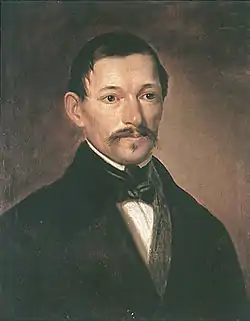 Jovan Sterija Popović is regarded as one of the best comic playwrights in Serbian literature.
Jovan Sterija Popović is regarded as one of the best comic playwrights in Serbian literature. Realist Borisav Stanković wrote several works which have been described as masterpieces.
Realist Borisav Stanković wrote several works which have been described as masterpieces. Miloš Crnjanski is a noted modernist writer and poet.
Miloš Crnjanski is a noted modernist writer and poet. Branko Ćopić is today remembered as a favorite writer of children stories and novels about Yugoslav partisans
Branko Ćopić is today remembered as a favorite writer of children stories and novels about Yugoslav partisans Borislav Pekić was a major writer and dramatist of the second half of the 20th century.
Borislav Pekić was a major writer and dramatist of the second half of the 20th century.
Scholars and scientists
Scientists and inventors
- Lazar the Hilandarian (fl. 1404), Serbian Orthodox monk who built the first mechanical clock tower in Russia
- Roger Joseph Boscovich (1711–1787)[30][106][107][108][109][110][111][112]
- Ignác Martinovics (1790–1838), Hungarian scholar of Serb descent
- Dimitrije Frušić (1790–1838), prominent medical doctor and journalist based in Trieste[35]
- Josif Pančić (1814–1888), botanist[35][30]
- Dimitrije Nešić (1836–1904), mathematician
- Sava Petrović (1839–1889), botanist
- Ljubomir Klerić (1844–2010), mining engineer and mathematician
- Sima Lozanić (1847–1935), chemist
- Laza Lazarević (1851–1891), physician
- Ognjeslav Kostović Stepanović (1851–1916), created "arbonite" (i.e. plywood).
- Marko Leko (1853–1932), chemist
- Mihajlo Idvorski Pupin (1854–1935), physicist, professor and inventor of a new telecommunications technology
- Draga Ljočić (1855–1926), Serbia's first female doctor and women's rights activist[30]
- Spiridon Gopčević (1855–1928), astronomer, also known by his nom de plume Leo Brenner, friend of American astronomer Percival Lowell
- Nikola Tesla (1856–1943), Serbian American physicist, inventor, and engineer known for his advancements in electrical power[30]
- Jovan Žujović (1856–1938), a pioneer in geological and paleontological science in Serbia
- Vuk Marinković (1807–1859), physicist
- Bogdan Gavrilović (1864–1947), mathematician
- Lujo Adamović (1864–1935), botanist
- Jovan Cvijić (1865–1927), geographer, ethnographer and geologist
- Vladimir Varićak (1865–1942), mathematician and theoretical physicist
- Mihailo Petrović Alas (1868–1943), author of the mathematical phenomenology and inventor of the first hydraulic computer capable to solve differential equations[30]
- Mileva Marić (1875–1948), mathematician, wife of Albert Einstein[30]
- Ivan Sarić (1876–1966), one of the earliest pioneers in aviation in Austria-Hungary and Serbia. His planes are on display at the Museum of Belgrade.
- Milutin Milanković (1879–1958), geophysicist, astronomer, writer, professor[30]
- Pavle Vujević (1881–1966), founder of the science of microclimatology, and one of the first in the science of potamology
- Ivan Đaja (1884–1957), biologist and physiologist
- Jovan Hadži (1884–1972), Slovenian zoologist
- Jovan Čokor (1885–1946), epidemiologist
- Siniša Stanković (1892–1974), biologist
- Ilija Đuričić (1898–1965), veterinary physician
- Jovan Karamata (1902–1967), mathematician
- Danilo Blanusa (1903–1987), mathematician, of Serb heritage
- Tatomir Anđelić (1903–1993), mathematician
- Đuro Kurepa (1907–1993), mathematician
- Petar Đurković (1908–1981), astronomer
- Dragoslav Mitrinović (1908–1995), mathematician
- Petar Đurković (1908–1981), astronomer
- Pavle Savić (1909–1994), physicist and chemist, together with Irène Joliot-Curie he was nominated for Nobel Prize in Physics[30]
- Milorad B. Protić (1911–2001), astronomer
- Rajko Tomović (1919–2001), physicist and inventor
- Dušan Kanazir (1921–2009), molecular biologist
- Obrad Vučurović (1921–2013), rocket scientist
- Nikola Hajdin (1923–2019), construction engineer
- Aleksandar Despić (1927–2005), physicist
- Bogdan Maglich (1928–2017), a nuclear physicist
- Mihajlo D. Mesarovic (1928), scientist and Club of Rome member.
- Jovan Rašković (1929–1992), psychiatrist
- Svetozar Kurepa (1929–2010), mathematician
- Tihomir Novakov (1929–2015), physicist
- Petar Gburčik (1931–2006), scientist and a professor of meteorology at the University of Belgrade. He was the author of the first mathematical models of the numerical weather prediction,[113] which were used operationally in the Weather Service of Yugoslavia from 1970 to 1977. In the same period, he began modelling of the atmospheric diffusion of air-pollution and created the first model of the spatial distribution of air-pollution[114]
- Miomir Vukobratovic (1931–2012), mechanical engineer and pioneer in humanoid robots
- Ljubisav Rakic (1931), neurobiologist
- Dušan Ristanović (1933), a medical biophysicist
- Miodrag Radulovacki (1933–2014), neuropharmacologist and professor
- Milan Kurepa (1933–2000), physicist
- Petar V. Kokotovic (1934), an engineering professor and theorist
- Milan Raspopović (1936), mathematician
- Milan Vukcevich (1937–2003), chemist and grandmaster of chess problem composition
- Miodrag Petković (1938), mathematician
- Gordana Vunjak-Novakovic (1948), biomedical engineer
- Gradimir Milovanović (1948), mathematician
- Zoran Knežević (1949), astronomer
- Bogdan Duricic (1950–2008), biochemist
- Zorica Pantic (1951), engineer and president of Wentworth Institute of Technology
- Marko V. Jaric (1952–1997), physicist
- Milivoje Kostic (1952), thermodynamicist and professor emeritus of mechanical engineering
- Voja Antonić (born 1952), inventor, journalist, writer, magazine editor, radio show contributor, also creator of a build-it-yourself home computer Galaksija
- Milan Damnjanović (1953), physicist
- Jasmina Vujic (1953), nuclear engineering professor at Berkeley, 1st female nuclear engineering department chair in the US[115][116]
- Stevo Todorčević (1955), mathematician
- Slobodan Antonić (1959), sociologist
- Milomir Kovac (1962), veterinary surgeon and professor
- Miodrag Stojković (1964), genetic scientist
- Ljubinka Nikolić (1964), geographer and geologist, future colonist chosen for the Mars One project (representing Serbia)[117]
- Aleksandar Kavčić (1968), electrical engineer and university professor[118]
- Maja Pantic (1970), A.I. expert and professor
- Jovo Bakić (1970), sociologist
- Vlatko Vedral (1971), physicist, known for his research on the theory of Entanglement and Quantum Information Theory
- Vladimir Markovic (1973), mathematician
- Dušanka Đokić (1983), physicist
- Teodor von Burg (born 1993), the most successful participant of the International Mathematical Olympiad,[119][120] 4 gold, 1 silver, 1 bronze medal
- Vesna Milosevic-Zdjelar, Serbian born Canadian astrophysicist and science educator
- Jelena Kovacevic, Dean of Engineering at NYU's Tandon School and Carnegie Mellon University
- Gojko Lalic, chemistry professor at the University of Washington[121]
Philosophers
- Dositej Obradović (1742–1811), author, philosopher, linguist, polyglot and the first minister of education of Serbia.
- Andrej Dudrovich (1783–1830), Russian national of Serb origin
- Petar II Petrović-Njegoš (1813–1851)
- Vladimir Jovanović (1833–1922)
- Svetozar Marković (1846–1875), sociologist[30]
- Ljubomir Nedić (1858–1902), one of the most quoted philosophers in the late 19th century, a student of Wilhelm Wundt and professor at the University of Belgrade
- Branislav Petronijević (1875–1954), philosopher and paleontologist in the first half of the 20th century[30]
- Veselin Čajkanović (1881–1946)
- Ion Petrovici (1882–1972), Romanian national of Serbian antecedents
- Dimitrije Mitrinović (1887–1953), philosopher, poet, revolutionary, mystic, theoretician of modern painting, traveller and cosmopolite.
- Justin Popović (1894–1979)
- Ksenija Atanasijević (1894–1981), the first recognised major female Serbian philosopher, and one of the first female professors of Belgrade University[30]
- Dimitrije Najdanović (1897–1986)
- Đuro Kurepa (1907–1992), logician
- Jevrem Jezdić (1916–1997)
- Mihailo Marković (1923–2010)
- Milan Damnjanović (1924–1994)
- Ljubomir Tadić[30] (1925–2013)
- Mihailo Đurić (1925–2011)
- Gajo Petrović (1927–1993)
- Branko Pavlović (1928–1996)
- Nikola Milošević (1929–2007)
- Svetozar Stojanović (1931–2010)
- Divna M. Vuksanović (1965)
- Vojin Rakić (1967)
- Davor Džalto (1980)
Historians and archeologists
- Jovan Rajić (1726–1801)
- Jovan Gavrilović (1796–1877), historian, politician, statesman, and public figure. He was the first President of the Serbian Learned Society.
- Božidar Petranović (1809–1874), wrote the history of world literature in the 1840s
- Gavrilo Vitković (1829–1902)
- Jovan Ristić (1831–1899)
- Nićifor Dučić (1832–1900), theologian, historian and writer
- Ilarion Ruvarac (1832–1905)
- Stojan Bošković (1833–1908)
- Panta Srećković (1834–1903)
- Mihailo Valtrović (1839–2015), archeologist
- Stojan Novaković (1842–1915)
- Risto Kovačić (1845–1909)
- Ljubomir Kovačević (1848—1918)
- Vid Vuletic Vukasović (1853–1933)
- Spiridon Gopčević (1855–1928)
- Prince Bojidar Karageorgevitch (1862–1908)
- Mihailo Gavrilović (1868–1924)
- Tihomir Đorđević (1868–1944)
- Slobodan Jovanović (1869–1958)
- Miloje Vasić (1869–1956), archaeologist
- Stanoje Stanojević (1873–1937)
- Jovan Radonić (1873–1953)
- Vladimir Petković (1874–1956)
- Dragutin Anastasijević (1877–1950)
- Dragutin Anastasijević (1877–1950)
- Vladimir Ćorović (1885–1941)
- Milan Kašanin (1895–1981)
- Vaso Čubrilović (1897–1990)
- Miodrag Grbic (1901–1969), archaeologist
- Milos Mladenovic (1903–1984), professor emeritus at McGill in Montreal
- Djoko Slijepčević, (1907–1993), church historian
- Svetozar Radojčić (1909–1978)
- Wayne S. Vucinich (1913–2005)
- Vladimir Dedijer (1914–1990)
- Jevrem Jezdić (1916–1997)
- Traian Stoianovich (1921–2005)
- Milorad M. Drachkovitch (1921–1996)
- Dejan Medaković (1922–2008)
- Desanka Kovačević-Kojić (1925)
- Branko Petranović (1927–1994)
- Milan Vasić (1928–2003)
- Milorad Ekmečić (1928–2015)
- Lazar Trifunović (1929–1983)
- Sima Ćirković (1929–2009)
- Božidar Ferjančić (1929–1998), historian and Byzantine scholar
- Vasilije Krestić (1932)
- Latinka Perović (1933)
- Rade Mihaljčić (1937–2020)
- Momčilo Spremić (1937)
- Gordana Lazarevich (1939), Serbian born Canadian musicologist and university department head[122]
- Predrag Dragić (1945–2012)
- Radivoj Radić (1954)
- Miroljub Jevtić (1955)
- Milan St. Protić (1957)
- Željko Fajfrić (1957)
- Dušan T. Bataković (1957–2017), historian and diplomat
- Anna Novakov (1959)
- Tibor Živković (1966–2013)
- Miloš Ković (1969)
- Lidija Seničar (1973)
- Čedomir Antić (1974)
Linguists and philogists
- Sava Mrkalj (1783–1833)
- Luka Milovanov Georgijević (1784–1828)
- Vuk Stefanović Karadžić (1787–1864), philologist and linguist who was the major reformer of the Serbian language[35]
- Vukašin Radišić (1810–1843), the first Serbian classical philologists to teach poetics
- Đuro Daničić (1825–1882), collaborated with Vuk Karadžić in reforming and standardizing the Serbian language, and translating the Bible from old Serbo-Slavonic into modern-day Serbian[35][30]
- Katarina Milovuk (1844–1909)
- Svetomir Nikolajevic (1844–1922), first professor at the Department of World Literature in Belgrade's School of Philosophy.
- Luko Zore (1846–1906)
- Milan Rešetar (1860–1942), linguist, Ragusologist, historian and literary critic
- Pavle Popović (1868–1939), literary critic and historian
- Nikola Vulić (1872–1945)
- Aleksandar Belić (1876–1960)
- Miloš Trivunac (1876–1944)
- Dragutin Anastasijević (1877–1950)
- Milan Budimir (1891–1975)
- Miloš N. Đurić (1892–1967), classical philologist, hellenist, classical translator and philosopher
- Emil Petrovici (1899–1968), Romanian linguist, who studied both Romanian and Slavic languages.
- Mateja Matejić (priest) (1924–2018), Slavist
- Pavle Ivić (1924–1999) was a leading South Slavic dialectologist and phonologist
- Mateja Matejić (1924–2018)
- Predrag Palavestra (1930–2014)
- Ljiljana Crepajac (1931)
- Nikola Moravčević (1935), literary historian and literary critic[123]
- Ivan Klajn (1937)
- Branko Mikasinovich (1938), Slavist
- Vladeta Janković (1940)
- Ljubiša Rajić (1947–2012)
- Darko Tanasković (1948)
- Aleksandar Loma (1955)
- Dejan Ajdačić (1959)
- Miodrag Kojadinović (1961)
- Milo Lompar (1962)
- Rajna Dragićević (1968)
Economists and sociologists
- Valtazar Bogišić (1834–1908), jurist and a pioneer in sociology.[124][30]
- Lazar Paču (1855–1915)
- Milan Stojadinović (1888–1961), Minister of Finance, Prime Minister of Yugoslavia 1935–1939
- Dragoslav Avramović (1919–2001)
- Radovan Kovačević, Serbian-American professor at the Southern Methodist University Research Center for Advanced Manufacturing, holder of several U.S. patents.[125]
- Sreten Sokić (1945)
- Miroljub Labus (1947), political economist
- Čedomir Čupić (1947)
- Branko Milanović (1953), leading economist in the World Bank's research department dealing with poverty and inequality, also a senior associate at the Carnegie Endowment for International Peace in Washington, D.C.
- Branislav Andjelić (1959)
- Jorgovanka Tabaković (1960)
- Kori Udovički (1961)
- Dejan Šoškić (1967)
- Radovan Jelašić (born 1968), Governor of the National Bank of Serbia 2004–2010
- Dušan Pavlović (professor) (1969)
Legal experts and lawyars
- Atanasije Dimitrijević Sekereš (1738–1794)
- Sava Tekelija (1761–1842), amongst the first Serbian doctor of law, president of the Matica srpska, philanthropist, noble, and merchant. Tekelija founded the Tekelijanum in Budapest in 1838 for Serb students studying in the city.[35]
- Gligorije Trlajić (1766–1811)
- Teodor Filipović (1778–1807), lawyer and professor who taught at the University of Harkov
- Konstantin Vojnović (1832–1903), politician, university professor and rector at University of Zagreb
- Nikodim Milaš (1845–1915), Serbian Orthodox bishop, polyglot, authority on church law and the Slavistics.
- Dragić Joksimović (1893–1951)
- Kosta Čavoški (born 1941), professor at the University of Belgrade's Law School and an outspoken critic of the International Criminal Tribunal for the former Yugoslavia.
- Sima Avramović (1950)
- Milan Antonijević (1975)
 Vuk Karadžić reformed the Serbian language and gave many contributions to the Serbian culture.
Vuk Karadžić reformed the Serbian language and gave many contributions to the Serbian culture.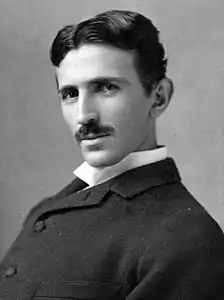
 Mihajlo Pupin, physicist and physical chemist and a founding member of NACA which later became NASA.[126]
Mihajlo Pupin, physicist and physical chemist and a founding member of NACA which later became NASA.[126].jpg.webp)
 Miloš N. Đurić was a classical philologist, hellenist, classical translator, philosopher.
Miloš N. Đurić was a classical philologist, hellenist, classical translator, philosopher.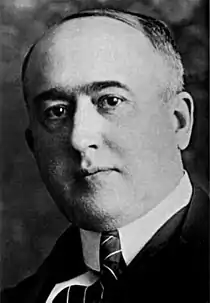
Sportspeople
Basketball
- John Abramovic (1919–2000)
- Nebojša Popović (1923–2001)
- Mike Todorovich (1923–2000)
- Aleksandar Nikolić "Aca" (1924–2000), FIBA Hall of Fame, Euroleague Top 10 coaches; WC Coach 78', EC Coach 77', EC Cup 70', 72', 73'
- Borislav Stanković[30] (1925–2020)
- Ranko Žeravica (1929–2015)
- Trajko Rajković (1937–1970)
- Radivoj Korać "Žućko" (1938–1969), FIBA Hall of Fame; top 50 in Europe, Euro MVP 61', Eponymous to FIBA Cup
- Dušan Ivković "Duda" (1943), Euroleague Top 10 coaches; FIBA Coach 90', EC Coach 89', 91', 95'; EC Player 73'
- Peter Maravich (1947–1988)
- Nikola Plećaš (1948)
- Svetislav Pešić (1949)
- Zoran Slavnić (1949)
- Zarko Zecevic (1950)
- Dražen Dalipagić "Praja" (1951), FIBA Hall of Fame; Mr. Europ
- Božidar Maljković "Boža" (1952), Euroleague Top 10 coaches, EL Coach
- Dragan Kićanović[127] (1953), FIBA Hall of Fame; Mr. Europa'
- Duško Vujošević (1959)
- Aco Petrović (basketball) (1959–2014)
- Željko Obradović (1960), 50 Greatest Euroleague Contributors
- Zoran Radović (1961)
- Radisav Ćurčić (1965)
- Dan Majerle (1965)
- Zoran Savić (1966)
- Branislav Prelević (1966)
- Aleksandar Đorđević (1967), Top 50 in Europe, Mr. Europa 94', 95', Euro MVP 97'[127][128]
- Vlade Divac[127] (1968), FIBA Hall of Fame; Top 50 in Europe, Mr. Europa 89'; Kennedy Award 00'; NBA All-Star 01'
- Miloš Babić (1968)
- Radenko Dobraš (born 1968)
- Nenad Marković (1968)
- Predrag Danilović (1970),[127][128] Top 50 in Europe, Mr. Europa and Italian League MVP 1998; EC 89', 91', 95', 97'
- Igor Kokoškov (1971)
- Željko Rebrača (1972)
- Dejan Bodiroga (1973)[127][128] Top 10 in 2000s Europe
- Dejan Tomašević (1973)
- Dragan Tarlać (1973)
- Miroslav Berić (1973)
- Predrag Drobnjak (1975)
- Milan Gurović (1975)
- Predrag Stojaković[127] (1977)
- Dušan Kecman (1977)
- Dejan Milojević (1977)
- Igor Rakočević (1978)
- Marko Jarić (1978), (NBA) EuroBasket 2001, 1st 2002 FIBA World Championship
- Ratko Varda (1979)
- Petar Popović (1979)
- Vladimir Radmanović (1980)
- Miloš Vujanić (1980)
- Žarko Čabarkapa (1981)
- Marko Popović (1982)
- Nenad Krstić (1983), All-Rookie NBA second team, EC Silver 09'
- Slavko Vraneš (1983)
- Sasha Pavlović (1983)
- Bojan Popović (1983)
- Velimir Radinović (1983)
- Mile Ilić (1984)
- Aleksandar "Aleks" Marić (1984)
- Kosta Perović (1985)
- Darko Miličić (1985), Serbian basketball player, NBA champion 2004
- Nikola Peković (1986), NBA
- Goran Dragić (1986), NBA[129]
- Miloš Teodosić (1987)
- Nikola Dragovic (1987)
- Nemanja Bjelica (1988)
- Boban Marjanović (1988)
- Bogdan Bogdanović (1992)
- Nikola Milutinov (1994)[130]
- Nikola Jokić (1995), NBA All-star
Football
- Milutin Ivković (1906–1943)
- Đorđe Vujadinović (1909–1990)
- Aleksandar Tirnanić (1910–1992)
- Ljubiša Broćić (1911–1995)
- Milovan Ćirić (1918–1986)
- Branko Stanković (1921–2002)
- Rajko Mitić (1922–2008)
- Tihomir Ognjanov (1927–2006)
- Vladimir Beara (1928–2014)
- Borivoje Kostić (1930–2011)
- Miljan Miljanić (1930–2012)
- Todor Veselinović (1930–2017)
- Vujadin Boškov (1931–2014)
- Miloš Milutinović (1933–2003)
- Vladimir Durković (1937–1972)
- Dragoslav Šekularac (1937–2019)
- Milutin Šoškić (1937)
- Milan Galić (1938–2014)
- Velibor Vasović (1939–2002)
- Vladimir Kovačević (1940–2016)
- Ilija Pantelić (1942–2014)
- Ilija Petković (1945)
- Dragan Džajić (1946)
- Doug Utjesenovic (1946), member of the Australian 1974 World Cup Squad
- Blagoje Paunović (1947–2014)
- Jovan Aćimović (1948)
- Radomir Antić (1948–2020)
- Dušan Bajević (1948)
- Vladislav Bogićević (1950)
- Vladimir Petrović (1955)
- Preki (1963), Serbian-born American player, named Major League Soccer MVP twice.
- Miodrag Belodedici (1964)
- Dragan Stojković (1965)
- Miroslav Đukić (1966)
- Saša Ćirić (1968)
- Vladimir Jugović (1969)
- Siniša Mihajlović (1969)
- Predrag Mijatović (1969)
- Zoran Mirković (1971)
- Bobby Despotovski (1971)
- Predrag Đorđević (1972)
- Darko Kovačević (1973)
- Savo Milošević (1973)
- Mladen Krstajić (1974)
- Ivica Dragutinović (1975)
- Saša Ilić (1977)
- Veljko Paunović (1977)
- Dejan Stanković (1978)
- Marko Nikolić (1979)
- Nikola Žigić (1980)
- Nemanja Vidić (born 1981), captain for Manchester United, has collection of honours including 3 consecutive Premier League titles (4 titles in total), the UEFA Champions League, the FIFA World Club Cup, three League Cup medals.[131]
- Aleksandar Luković (1982)
- Branislav Ivanović (1984)
- Miloš Krasić (1984)
- Damir Kahriman (1984)
- Aleksandar Kolarov (1985)
- Duško Tošić (1985)
- Zdravko Kuzmanović (1987)
- Milorad Arsenijević (1987)
- Nemanja Matić (1988)
- Ljubomir Fejsa (1988)
- Bojan Krkić (1990)
- Aleksandar Katai (1991)
- Filip Mladenović (1991)
- Uroš Spajić (1993)
- Sergej Milinković-Savić (1995)
- Uroš Račić (1998)
Tennis
- Jelena Genčić (1936–2013)
- Slobodan Živojinović (1963)
- Daniel Nestor (1972), Canadian, born in Belgrade
- Nenad Zimonjić (1976)
- Dušan Vemic (1976)
- Dejan Petrovic (1978)
- Jelena Dokić (1983), former world No. 4 (19 August 2002), six WTA
- Frank Dancevic (1984), plays for Canada
- Janko Tipsarević (1984)
- Jelena Janković (1985)
- Viktor Troicki (1986)
- Novak Đoković (born 1987)
- Ana Ivanović (1987)
- Andrea Petković (1987), Bosnian Serb, German national, two WTA
- Vesna Dolonc (1989)
- Nikola Čačić (1990)
- Miloš Raonić (1990), Montenegrin Serb and plays for Canada
- Bojana Jovanovski (1991)
- Kristina Mladenović (1993), French of Serbian parentage
Boxing
- Zvonimir Vujin (1943–2019), Olympic medalist
- Marijan Beneš (1951), Light Heavyweight, European Amateur Boxing Championship 1973 Gold, European Boxing Union 1979
- Marijan Beneš (1951), light heavyweight
- Sreten Mirković (1955–2016), European Amateur Boxing Championship 1979 Silver
- Tadija Kačar (1956), Light Heavyweight, Olympic Silver Montréal 1976
- Slobodan Kačar (1957), Light Heavyweight, Olympic Gold Moscow 1980
- Aleksandar Pejanović (1974–2011), Super Heavyweight, Bronze 2001 Mediterranean Games
- Neven Pajkić (1977), Bosnian Serb, Canadian Boxing Federation Champion
- Nenad Borovčanin (1978), current European Cruiserweight boxing champion, undefeated with 30 wins and no losses
- Nikola Sjekloća (1978), Intercontinental 75 kg WBC
- Geard Ajetović (1981), welterweight
- Zdravko Mićević (1982), Serbian-born Australian light-heavyweight champion
- Marco Huck (1984), Serbian-born German, cruiserweight, world champion
Other
- Ivan Sarić (1876–1966), wrestler and a pioneer in aviation
- Giovanni Raicevich (1881–1957), Greco-Roman wrestler (European Champion, 1909)
- Paul Radmilovic (1886–1968), water polo player for Great Britain in the 1912 Olympics in Stockholm
- Boris Kostić (1887–1963), chess player
- Dragutin Tomašević (1890–1915), track and field athlete
- Johnny Miljus (1895–1976), MLB player
- James Trifunov (1903–1993), Serbian-Canadian Olympic medalist in wrestling
- Steve Swetonic (1903–1974), MLB Player
- Ozren Nedeljković (1903–1984), chess player
- Vasilije Tomović (1906–1994), chess player
- Mike Kreevich (1908–1994), MLB player, notable center fielder during the 1930s and 1940s
- Petar Trifunović (1910–1980), chess player
- Steve Sundra (1910–1952), 1939 World Series Champion
- Al Niemiec (1911–1995), player for the Boston Red Sox, Philadelphia Athletics, and Seattle Rainiers
- George Kakasic (1912–1973), chess player
- Emil Verban (1915–1989), MLB player
- Nick Strincevich (1915–2011), MLB player
- Pete Suder (1916–2006), MLB player
- Wally Judnich (1916–1971), MLB player
- Jess Dobernic (1917–1998), MLB player
- Bill Vukovich (1918–1955), Serbian American automobile racing driver
- Babe Martin (1920–2013), MLB player
- Svetozar Gligorić (1923–2012), chess player
- Dragoljub Janošević (1923–1993), chess player
- Walt Dropo (1923–2010), MLB player
- Joe Tepsic (1923–2009), MLB Player
- Dragoljub Velimirović (1942–2014), chess player
- Borislav Milić (1925–1986), chess player
- Bronko Lubich (1925–2007) was a wrestler, referee and trainer
- Rocky Krsnich (1927–2019), MLB player
- Aleksandar Matanović (1930), chess player
- Mike Krsnich (1931–2011), MLB player
- Milunka Lazarević (1932–2018), chess player
- Borislav Ivkov (1933), chess player
- Eli Grba (1934–2019), American League Champion with the New York Yankees
- Branislav Simic (1935), Olympic champion in wrestling
- Milan Matulović (1935–2013), chess player
- Dimitrije Bjelica (1935), chess player
- Dragoljub Ciric (1935–2014), chess player
- Milan Vukčević (1937–2003), chess player
- Branislav Martinović (1937–2015), Olympic medalist in wrestling
- Predrag Ostojić (1938–1996), chess player
- Alex Andjelic (1940), coach
- Paul Popovich (1940), MLB player
- Mickey Lolich (1940), MLB Player
- Mirko Sandić (1942–2006), water polo player, member of FINA Hall of Fame
- Milan Vukić (1942), chess player
- Mike Kekich (1945), MLB player
- Ljubomir Vračarević (1947–2013), Serbian martial artist and founder of Real Aikido
- John Vukovich (1947–2007), MLB player and coach
- Vera Nikolić (1948), track and field athlete, double European Champion in 800m, former World record holder
- Slavko Obadov (1948), Olympic medalist in judo
- Doc Medich (1948), MLB player
- Ljubomir Ljubojević (1950), chess player
- Boško Abramović (1951), chess player
- Dave Rajsich (1951), MLB player
- Peter Vuckovich (1952), AL Cy Young winner
- Zoran Pančić (1953), Olympic medalist in rowing
- Milorad Stanulov (1953), Olympic medalist in rowing
- Momir Petkovic (1953), Olympic champion in wrestling
- Radomir Kovačević (1954–2006), Olympic medalist in judo
- Gary Rajsich (1954), MLB player
- George Vukovich (1956), MLB player
- Mile Isaković (1958), Olympic champion in handball
- Dan Radakovich (1958), sports administrator
- Petar Popović (1959), chess player
- Svetlana Dašić-Kitić (1960), handball player, voted the best of all time
- Predrag Nikolić (1960), chess player
- Mirko Nišović (1961), Olympic champion in canoeing
- Branko Damljanović (1961), chess player
- Gordana Perkučin (1962), table tennis professional
- Goran Maksimović (1963), Olympic champion in sports shooting
- Igor Milanović (1965), water polo player
- Jasna Šekarić (1965), multiple Olympic medalist in sports shooting
- Zoran Zorkic (1966), golf coach in Texas
- Ilija Lupulesku (1967), Olympic medalist in table tennis
- Dragan Škrbić (1968), handball player
- Dragan Škrbić (1968), handball player, IHF World Player of the Year 2000
- Dejan Antić (1968), chess player
- Vladimir Grbić (1970), Olympic champion in volleyball, Volleyball Hall of Fame)
- Alisa Marić (1970), chess player
- Mirjana Marić (1970), chess player
- Dragutin Topić (1971), track and field athlete, World junior record holder in high jump with 2.37
- Ryan Radmanovich (1971), MLB Player and member of Canada Olympic baseball team
- Miloš Milošević (1972), swimmer
- Borislava Perić (1972), table tennis professional
- Nikola Grbić (1973), Olympic champion in volleyball and coach
- Bojana Radulović (1973), handball player
- Ljubomir Vranjes (1973), handball player
- Vladimir Vujasinović (1973), water polo player
- Paola Vukojicic (1974), field hockey player
- Aleksandra Ivošev (1974), Olympic champion in sports shooting
- Igor Miladinović (1974), chess player
- Dejan Savić (1975), waterpolo trainer[132]
- Aleksandar Karakašević (1975), table tennis professional
- Ivan Prokić (1975)
- Danilo Ikodinović (1976), water polo player
- Lavinia Milosovici (1976), Romanian gymnast of Serbian origin, multiple Olympic champion
- Andrija Gerić (1977), Olympic champion in volleyball
- Pavle Jovanovic (1977–2020), Serbian-American bobsledder
- Ivan Ivanišević (1977), chess player
- Biljana Golić (1977), table tennis professional
- Erik Bakich (1977), college baseball coach
- Rhonda Rajsich (1978), American racquetball player of Serbian origin
- Aleksandar Šapić (1978), Serbian politician and a retired water polo player, multiple Olympic medalist
- Ivan Miljković (1979), one of the most decorated volleyball players in the world
- Dragan Šolak (1980), chess player
- Bojan Vučković (1980), chess player
- Nataša Dušev-Janić (1982), Olympic champion in canoeing
- Vanja Udovičić (1982), water polo player
- Nenad Gajic (1983), lacrosse player
- Nick Zoricic (1983–2012), Serbian-born, professional Canadian skier
- Ljilja Drljević (born 1984), chess player
- Dragan Umicevic (1984)
- Brian Bogusevic (1984), MLB player
- Milorad Čavić (1984), Olympic medalist in swimming
- Nikola Karabatić (1984), French handball player (Serbian mother)
- Maja Ognjenović (1984), volleyball player, Olympic medalist
- Nada Matić (1984), table tennis professional
- Jeff Samardzija (1985), MLB player
- Filip Filipović (1987), waterpolo player[132]
- Nađa Higl (1987), swimmer
- Andrea Arsović (1987), sports shooter
- Nenad Pagonis (1987), kickboxing champion
- Andrija Prlainović (1987), water polo player
- Borki Predojević (1987), chess player
- Milan Lucic (1988), Canadian
- Sara Isaković (1988), Olympic medalist in swimming
- Jovana Brakočević (1988), volleyball player
- Ivana Španović (1990), track and field athlete
- Milica Mandić (1991), Olympic champion in taekwondo
- Christian Yelich (1991), MLB player
- Aleksandar Rakić (1992), mixed martial artist[133]
- Velimir Stjepanović (1993), swimmer
- Nikola Jakšić (1997), waterpolo player[132]
- Tijana Bošković (1997), volleyball player, Olympic medalist
- Staša Gejo (1997), sport climber
- Tijana Bogdanović (1998), Taekwondo practitioner[132]
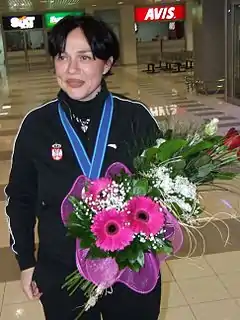
.jpg.webp) Nemanja Vidić was twice named in the FIFA FIFPro World XI and as the Premier League Player of the Season.
Nemanja Vidić was twice named in the FIFA FIFPro World XI and as the Premier League Player of the Season. Filip Filipović won every major award in water polo.
Filip Filipović won every major award in water polo.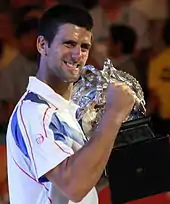 Novak Djokovic is one of the best tennis players of all times.
Novak Djokovic is one of the best tennis players of all times..jpg.webp) Ivana Španović holds the national and World record in long jump.
Ivana Španović holds the national and World record in long jump..jpg.webp) Nikola Jokić is Olympic silver medalist, two-time NBA All-Star and 2018–19 All-NBA First team member.
Nikola Jokić is Olympic silver medalist, two-time NBA All-Star and 2018–19 All-NBA First team member.
Royalty
Monarchs
Princesses

Despot Stefan Lazarević was regarded as one of the finest knights and military leaders of his time.
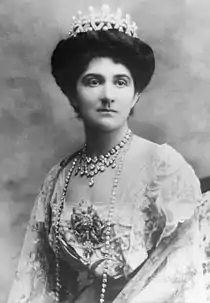
Princess Jelena of Montenegro was Queen of Italy from 1900 until 1946.
- Jelena Vukanović, (b. after 1109–1146), Queen of Hungary
- Jelisaveta Nemanjić, (fl. 1270–1331), Baness of Bosnia
- Princess Milica of Serbia, (ca. 1335–1405)
- Ana-Neda (fl. 1323–1324), Empress of Bulgaria
- Dragana of Serbia (late 14th century), Empress of Bulgaria
- Jelena Balšić, (1365/1366–1443), Lady of Zeta; Grand Duchess of Hum
- Helena Dragaš, (c. 1372–1450), Byzantine empress, mother of emperors John VIII Palaiologos and Constantine XI Palaiologos
- Olivera Lazarević (1372–1444), Princess of Serbia, and sultana (wife of Ottoman sultan Bayezid I)
- Mara Branković (c. 1416–1487), Princess of Serbia, and sultana (wife of Ottoman sultan Murad II)
- Kantakuzina Katarina Branković, (1418/19 – 1492), countess of County of Celje
- Mara Branković (c. 1447 – c. 1500), last Queen of Bosnia and Despina of Serbia
- Marija Branković (1466–1495), Princess of Serbia and Marchioness of Montferrat (d. 1495)
- Milica Despina of Wallachia, (c. 1485 – 1554), Princess of Wallachia, regent in Wallachia in 1521–1522
- Jelena Rareš, princess of Moldavia, regent in 1551–1553
- Aşub Sultan (1627–1690), consort of Ottoman Sultan and Valide Sultan
- Şehsuvar Sultan (1682–1756), valide sultan
- Ljubica Vukomanović, (1788–1843), Princess of Serbia
- Persida Nenadović, (1813–1873), Princess of Serbia
- Darinka Kvekić, (1838–1892), Princess of Montenegro
- Milena Vukotić, (1847–1923), Queen of Montenegro
- Draga Mašin, (1864–1903), Queen of Serbia
- Princess Zorka of Montenegro, (1864–1890), Queen of Serbia
- Jelena Petrović Njegoš, (1873–1952), Queen of Italy
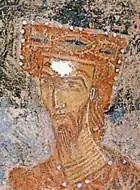 Mihailo Vojislavljević reigned for three decades in the 11th century.
Mihailo Vojislavljević reigned for three decades in the 11th century. Dušan the Mighty created the Serbian Empire.
Dušan the Mighty created the Serbian Empire.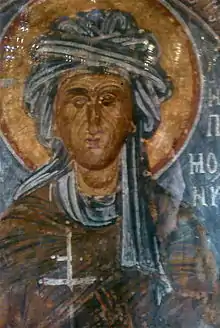 Helena Dragaš was the empress consort of Byzantine emperor Manuel II Palaiologos and mother of the last two emperors.
Helena Dragaš was the empress consort of Byzantine emperor Manuel II Palaiologos and mother of the last two emperors. Miloš Obrenović I of Serbia founded the Obrenović dynasty and autonomus Serbia.
Miloš Obrenović I of Serbia founded the Obrenović dynasty and autonomus Serbia. Nicholas I of Montenegro was the ruler of Montenegro from 1860 to 1918.
Nicholas I of Montenegro was the ruler of Montenegro from 1860 to 1918. Peter I of Serbia reigned as the last King of Serbia and as the first King of the Serbs, Croats and Slovenes.
Peter I of Serbia reigned as the last King of Serbia and as the first King of the Serbs, Croats and Slovenes.
Politicians and diplomats
Politicians
- Šćepan Mali (c. 1739–1773)
- Lazar Arsenijević Batalaka (1793–1869)
- Petar Ičko (1755—1808)
- Jakov Nenadović[35] (1765–1836)
- Miljko Radonjić (1770–1836), FM
- Petar Dobrnjac (1771–1831)
- Petar Nikolajević Moler (1775–1816)
- Toma Vučić-Perišić (1787–1859)
- Dimitrije Davidović[30] (1789–1838)
- Avram Petronijević (1791–1852)
- Jevrem Nenadović (1793–1867)
- Cvetko Rajović (1793–1897), PM
- Tenka Stefanović (1797–1865)
- Aleksa Simić (1800–1872), PM
- Stefan Marković (1804–1864), PM
- Stevan Knićanin[35] (1807—1855)
- Ilija Garašanin (1812–1874), PM
- Stanojlo Petrović (1813–1893)
- Jovan Subotić[35] (1817–1886)
- Nikola Hristić (1818–1911), PM
- Filip Hristić (1819–1905), PM
- Niko Pucić (1820–1893)
- Medo Pucić (1821–1882)
- Jovan Marinović (1821–1893)
- Jovan Ilić (1824–1901)
- Milivoje Petrović Blaznavac (1824–1873)
- Stjepan Mitrov Ljubiša (1824–1878)
- Nikša Gradi (1825–1894)
- Gavro Vučković Krajišnik (1826–1876)
- Svetozar Miletić (1826–1901)
- Jovan Belimarković (1827–2006)
- Jovan Ristić (1831–1899), PM
- Milan Piroćanac (1837–1937), PM
- Sava Grujić (1840–1913), PM
- Jovan Avakumović (1841–1928), PM
- Ljubomir Kaljević (1841–1907)
- Stojan Novaković (1842–1915), PM
- Đorđe Simić (1843–1912), PM
- Svetomir Nikolajević (1843–1922)
- Nikola Pašić (1845–1926), PM[30]
- Lazar Tomanović (1845–1932), PM
- Mita Rakić (1846–1890)
- Svetozar Marković (1846–1875), Socialist
- Petar Velimirović (1848–1911), PM
- Sava Bjelanović (1850–1897)
- Kosta Hristić (1852—1927)
- Golub Janić (1853—1918)
- Andra Nikolić (1853–1918), FM
- Kosta Taušanović (1854–1902)
- Jaša Tomić (1856–1922)
- Marko Car (1859–1953)
- Ljubomir Davidović (1863–1940), (Democrat)
- Milenko Radomar Vesnić (1863–1921), PM
- Ljubomir Jovanović (1865—1928)
- Dragiša Lapčević (1867–1939)
- Jaša Prodanović (1867–1948)
- Slobodan Jovanović (1869—1958)
- Jovan Ćirković (1871–1928)
- Žika Rafajlović (1871–1953)
- Velimir Vukićević (1871–1930), PM
- Milorad Drašković (1873–1921)
- Nikola Uzunović (1873–1954)
- Đura Dokić (1873–1946)
- Vasa Jovanović (1874—1970)
- Bogdan Radenković (1874–1917)
- Svetozar Pribićević (1875–1936)
- Vojislav Marinković (1876–1935)
- Milan Grol (1876–1952)
- Momčilo Ninčić (1876–1949)
- Josif Kostić (1877—1960)
- Petar Živković (1879–1947), PM
- Milan Srškić (1880–1937)
- Panta Draškić (1881–1957)
- Vasilije Trbić (1881–1962)
- Dimitrije Tucović (1881–1914)
- Aristotel Petrović (1881—1920), mayor of Sarajevo
- Ilija Šumenković (1881–1962)
- Milan Stojadinović (1881–1960), PM
- Vlada Ilić (1882–1952)
- Dušan Simović (1882–1962), PM
- Dušan A. Popović (1885–1918)
- Svetozar Delić (1885–1967), Communist mayor of Zagreb
- Dragiša Stojadinović (1886–1968)
- Puniša Račić (1886–1944)
- Bogoljub Jevtić (1886–1960)
- Živko Topalović (1886–1972)
- Bogoljub Kujundžić (1887—1949)
- Stevan Moljević (1888–1959)
- Sima Marković (1888–1939), Communist
- Petar Dobrović (1890–1942)
- Tanasije Dinić (1891–1946)
- Božidar Purić (1891–1977)
- Dimitrije Ljotić (1891–1945)
- Dragutin Jovanović-Lune (1892–1932)
- Dragiša Cvetković (1893–1969), PM
- Rodoljub Čolaković (1900–1983), Communist
- Aleksandar Ranković (1900–1983), Communist
- Jovan Veselinov (1906—1982)
- Milovan Đilas (1911—1995)
- Petar Stambolić (1912—2007)
- Milentije Popović (1913–1971), Communist
- Vladimir Dedijer (1914–1990), Communist
- Miloš Minić, (1914–2003), Communist
- Dragoslav Marković (1920–2005)
- Dobrica Ćosić (1921–2014)
- Antonije Isaković (1923—2002)
- Jovan Dejanović (1927–2019)
- Dušan Čkrebić (1927)
- Borisav Jović (1928), former president of Yugoslavia
- Milan Panić (1929), PM
- Jovan Rašković (1929–1992)
- Dragoljub Mićunović (1930)
- Branislav Crnčević (1933–2011)
- Latinka Perović (1933), Communist
- Radmilo Bogdanović (1934–2014)
- George Voinovich (1936–2016)
- Nikola Koljević (1936–1997)
- Ivan Stambolić (1936–2000), Communist
- Mirko Marjanović (1937–2006)
- Trivo Inđić (1938—2020)
- Slobodan Milošević (1941–2006)
- Borislav Paravac (1943)
- Vojislav Koštunica (1944), PM
- Radovan Karadžić (1945)
- Radomir Naumov (1946–2015)
- Veroljub Stevanović (1946)
- Vuk Drašković (1946), FM
- Miroljub Labus (1947)
- Savo Štrbac (1949)
- Mirko Cvetković (1950), PM
- Velimir Ilić (1951)
- Zoran Đinđić (1952–2003), PM
- Tomislav Nikolić (1952), President of Serbia
- Oliver Ivanović (1953—2018)
- Bogić Bogićević (1953)[134]
- Drago Kovačević (1953—2019)
- Radoman Božović (1953), PM
- Nenad Bogdanović (1954–2007), Mayor of Belgrade
- Milan Martić (1954)
- Zoran Stanković (1954)
- Vojislav Šešelj (1954)
- Predrag Marković (1955)
- Tomica Milosavljević (1955)
- Rod Blagojevich (1956)
- Milan Babić (1956–2006)
- Mirko Šarović (1956)
- Goran Knežević (1957)
- Dragan Čavić (1958), President of Republika Srpska
- Nebojša Čović (1958)
- Boris Tadić (1958), President of Serbia
- Zdravko Krivokapić (1958)
- Gordana Čomić (1958)
- Milorad Dodik (1959), President of Republika Srpska
- Slaviša Ristić (1961)
- Đorđe Vukadinović (1962), MP
- Zoran Radojičić (1963)
- Goran Svilanović (1963)
- Dunja Mijatović (1964)
- Mlađan Dinkić (1964)
- Andrija Mandić (1965), leader of Serbs in Montenegro
- Slobodan Vuksanović (1965)
- Ivica Dačić (1966), PM, FM
- Milan Parivodić (1966)
- Claudia Pavlovich Arellano (1969), Mexican politician
- Miodrag Linta (1969)
- Aleksandar Vučić (1970), President of Serbia
- Radovan Ničić (1971)
- Siniša Mali (1972)
- Aleksandar Vulin (1972)
- Vuk Jeremić (1975)
- Nikola Selaković (1983)
- Draško Stanivuković (1993)
Diplomats
- Damjan Ljubibratić (c. 16th–17th century)
- Sava Vladislavich (1669–1738)
- Lazar Teodorović (1771–1846)
- Jeremija Gagić (1783–1859)
- Petar Čardaklija (1808)
- Kosta Magazinović (1819–1891)
- Jevrem Grujić (1827–1895)
- Milan Petronijević (1831–1914)
- Milovan Milovanović (1863–1912)
- Ivan Ivanić (1867–1935)
- Mihailo Gavrilović (1868–1924)
- Slavko Grujić (1871–1937)
- Jovan Dučić (1871–1943)
- Boško Čolak-Antić (1871–1949)
- Pavle Beljanski (1892–1965)
- Borisav Jović (1928)
- Stanimir Vukićević (1948)
- Ivo Visković (1949)
- Ivan Mrkić (1953)
- Nebojša Rodić (1953)
- Dušan T. Bataković (1957–2017), historian and diplomat
- Vladimir Božović (1970), historian and diplomat
 Ilija Garašanin was a 19th-century statesman.
Ilija Garašanin was a 19th-century statesman.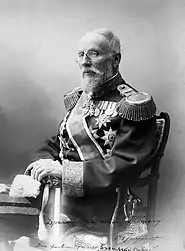 General Sava Grujić served as PM on five terms.
General Sava Grujić served as PM on five terms. Stojan Novaković was a noted politician, diplomat and a scholar.
Stojan Novaković was a noted politician, diplomat and a scholar.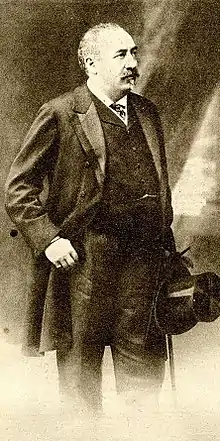 Milovan Milovanović played an important role in Serbia's diplomacy and policy-making.
Milovan Milovanović played an important role in Serbia's diplomacy and policy-making. Milovan Đilas was a well-known Yugoslav communist and one of the most prominent dissidents in Eastern Europe.
Milovan Đilas was a well-known Yugoslav communist and one of the most prominent dissidents in Eastern Europe. Zoran Đinđić served as the first democratically elected PM, until his assassination in 2003.
Zoran Đinđić served as the first democratically elected PM, until his assassination in 2003.
Military
Homeland and regional
- Constantine Tikh of Bulgaria (fl. 1257–77), tsar of Bulgaria
- Novak Grebostrek (fl. 1312–14)
- Miloš Obilić (d. 1389), knight and national hero
- Ivan Kosančić (d. 1389), knight
- Milan Toplica (d. 1389), knight
- Péter Petrovics (c. 1486 – 1557)
- Starina Novak (1530–1601), Hajduk and Moldavian ally
- Vuk Mandušić (16??–1648), commander in Venetian service, active in the Dalmatian hinterland.
- Janko Mitrović (1613–1659), commander in Venetian service, active in the Dalmatian hinterland.
- Bajo Pivljanin (1630–1685), commander in Venetian service, active in Montenegro and Dalmatia.
- Stojan Janković (1636–1687), commander in Venetian service, active in the Dalmatian hinterland.
- Cvijan Šarić (1652–1668), commander in Venetian service, active in the Dalmatian hinterland.
- Constantin Brancoveanu (1654–1714), Wallachia
- Ilija Perajica (d. 1685)
- Stanislav Sočivica (1715–1777), Serbian rebel leader, active in Bosnia and Herzegovina and Montenegro.
- Bogić Vučković (18th century), Serbian rebel leader
- Radič Petrović (1738–1816)
- Aleksa Nenadović[35] (1749–1804)
- Koča Andjelković (1755–1788), Austrian volunteer and Serbian rebel leader.
- Hadži-Prodan Gligorijević (1760–1825), commander in the First Serbian Uprising and volunteer in the Greek War of Independence[35]
- Mladen Milovanović (1760–1823), commander in the First Serbian Uprising[35]
- Karađorđe (1762–1817), leader of the First Serbian Uprising (1804–13)[35]
- Stanoje Glavaš[35] (1763–1815)
- Ilija Birčanin[35] (1764–1804)
- Jakov Nenadović (1765–1836), commander in the First Serbian Uprising
- Vasa Čarapić[35] (1768–1806)
- Stevan Sinđelić (1771–1809), commander in the First Serbian Uprising
- Petar Dobrnjac (1771–1831), commander in the First Serbian Uprising[35]
- Luka Lazarević[35] (1774–1852)
- Čolak-Anta Simeonović (1777–1853), commander in the First Serbian Uprising
- Matija Nenadović (1777–1854), commander in the First Serbian Uprising[30]
- Cincar-Janko[35] (1779–1833)
- Hajduk Veljko Petrović (1780–1813), commander in the First Serbian Uprising[35]
- Uzun-Mirko[35] (1782–1868)
- Arsenije Loma[35] (1785–1815)
- Sima Nenadović (1793–1815), commander in the First Serbian Uprising
- Janko Katić[35] (1795–1806)
- Vasos Mavrovouniotis (1797–1847), volunteer in the Greek War of Independence
- Dimitrije Ljotic (1801–1945)
- Novica Cerović (1805–1895)[135]
- Bogdan Zimonjić (1813–1909)
- Golub Babić (1824–1910), guerrilla chief
- Marko Miljanov (1826–1875), Brda chieftain
- Pecija (1833–1901), Serb hajduk from Bosanska Krajina
- Mićo Ljubibratić (1839–1889), fought in a detachment commanded by Giuseppe Garibaldi
- Evgenije Popović (1842–1943), fought in a detachment commanded by Giuseppe Garibaldi
- Jovan Mišković (1844–1908), commander in the Serbian-Turkish Wars (1876-1878)
- King Peter I of Serbia (1844–1921)
- Rista Cvetković-Božinče (1845–1878)
- General Radomir Putnik[30] (1847–1917)
- Ljubomir Kovačević (1848–1918)
- General Pavle Jurišić Šturm (1848–1922)
- General Jovan Atanacković (1848–1921)
- General Božidar Janković (1849–1920)
- Gavro Vuković (1852–1918)
- General Živojin Mišić[30] (1855–1921)
- General Stepa Stepanović (1856–1929)
- General Vojin Čolak-Antić (1877–1945)
- General Petar Bojović[30] (1858–1945)
- Aksentije Bacetić (1860–1915)
- Avram Cemović (1864–1914)
- Janko Vukotić (1866–1927)
- Milivoje Stojanović (1873–1914)
- General Milan Nedić (1878–1946)
- Svetozar Ranković-Toza (1880–1914)
- General Vojin Popović (1881–1916), also known as Vojvoda Vuk.
- Major Dragutin Gavrilović (1882–1945)
- General Dušan Simović (1882–1962)
- Blažo Đukanović (1883–1943)
- Dragutin Matić (1888–1970)
- Milunka Savić (1888–1973), war heroine of the 1913 Balkan War and World War I, wounded nine times.[30]
- General Draža Mihailović (1893–1946)
- Petar Leković (1893–1942), soldier for the Serbian Army and Yugoslav Partisans. He was declared the first national hero of Yugoslavia.
- Gavrilo Princip (1894–1918), Bosnian Serb assassin of Archduke Franz Ferdinand of Austria, which triggered the World War I
- Sofija Jovanović (1895–1979), war heroine of the 1913 Balkan War and World War I
- Kosta Mušicki (1897–1946)
- Jezdimir Dangić (1897–1947)
- Sava Kovačević (1905–1943)
- Momčilo Gavrić (1906–1993), the youngest known soldier in the WWI
- Velimir Piletić (1906–1972)
- Momčilo Đujić (1907–1999), Chetnik voivode
- General Koča Popović (1908–1992)
- Milan Spasic (1909–1941), naval hero of WWII
- Major Pavle Đurišić (1909–1945)
- General Kosta Nađ (1911–1986)
- Major Jovan Deroko (1912–1941)
- General Peko Dapčević (1913–1999)
- General Nikola Ljubičić (1916–2005)
- Ilija Monte Radlovic served in the British Army during WWII
- General Veljko Kadijević (1925–2014)
- Nikola Kavaja (1932–2008)
- General Blagoje Adžić (1932–2012)
- General Života Panić (1933–2003)
- General Dragoljub Ojdanić (1941)
- General Ratko Mladić (1942), army general and chief commander
- General Nebojša Pavković (1946)
- General Vladimir Lazarević (1949)
- Jovica Stanišić (1950), intelligence officer and head of the State Security Service
- General Ljubiša Jokić (1958)
- Srđan Aleksić (1966–1993), soldier
Foreign service
- Austria and Hungary
- At the end of the 15th century, Raci warriors came to the Polish Kingdom and played an important role in forming the Polish hussars.
- Mlatišuma (1664–1740), Austrian service, as a part of Serbian Militia (1718–39)
- Jovan Monasterlija (fl. 1683–1706), led Serbian Militia in the name of Leopold I, Holy Roman Emperor against the Turks.
- Jeronim Ljubibratić (1716–1779), Austrian Field marshal
- Arsenije Sečujac (1720–1814), Austrian general
- Adam Bajalics von Bajahaza (1734–1800), Austria-Hungary
- Paul Davidovich (1737–1814), Austria-Hungary
- Paul von Radivojevich (1759–1829), Austrian general
- Karl Paul von Quosdanovich (1763–1817), Austrian general
- Stevan Šupljikac Voivod (Duke) of Serbian Vojvodina (1786–1848), Austria-Hungary[35]
- Janos Damjanich (1804–1849), Hungarian General
- Sebo Vukovics (1811–1872), Hungary
- Petar Preradović (1818–1872), Austrian general
- Jakov Ignjatović (1822–1889), Hungary
- Emanuel Cvjetićanin (1833–1919), Austro-Hungarian Feldmarschalleutnant
- Emil Vojnović (1851–1927), Austrian general and military historian
- Svetozar Boroević (1856–1920), Baron von Bojna, Austro-Hungarian field marshal of Serb origin
- Emil Uzelac (1867–1954), Austro-Hungarian military commander
- Dome Sztojay (1883–1946), Hungary
- Ottoman Empire
- Veli Mahmud Pasha (1420–1474), Grand Vizier[136]
- Zagan Pasha (1446–1462/1469), Grand Vizier
- Skenderbeg Crnojević (1457–1528)
- Gedik Ahmed Pasha (d. 1482), Grand Vizier 1474–77; Serb from Vranje.[137]
- Deli Husrev Pasha (c. 1495–1554), statesman and second Vizier
- Sokollu Mehmed Pasha (1506–1579), Ottoman Grand Vizier
- Hadım Ali Pasha (d. 1511), Grand Vizier
- Lala Mustafa Pasha (c. 1500–1580), Grand Vizier
- Telli Hasan Pasha (c. 1530–1595), beylerbey
- Semiz Ali Pasha (d. 1565), Grand Vizier
- Ferhad Pasha Sokolović (d. 1586), Governor of Bosnia
- Boşnak Derviş Mehmed Pasha (c. 1569–1606), Grand Vizier
- Yavuz Ali Pasha (d. 1604), Ottoman Governor of Egypt from 1601 to 1603
- Sokolluzade Lala Mehmed Pasha (d. 1606), Grand Vizier
- Nevesinli Salih Pasha (d. 1647), Grand Vizier
- Kara Musa Pasha (d. 1649), Grand Vizier
- Sarı Süleyman Pasha (d. 1687), Grand Vizier
- Aşub Sultan (d. 1690), originally Katarina, consort of Sultan Ibrahim I and mother of Sultan Suleiman II.[138][139][140]
- Osman Aga of Temesvar (1670–1725), Ottoman commander
- Şehsuvar Sultan, originally Maria, consort of Sultan Mustafa II (r. 1695–1703) and mother of Sultan Osman III (r. 1754–1757).[141]
- Daltaban Mustafa Pasha (d. 1703), Grand Vizier
- Ivaz Mehmed Pasha (d. 1743), Grand Vizier
- Sali Aga
- Aganlija (fl. 1801–1804)
- Kučuk-Alija (fl. 1801 – 5 August 1804)
- Sinan-paša Sijerčić (d. 1806), Ottoman Bosnian general. Bosnian Serb origin.[142][143]
- Omar Pasha (Serbian: Mihajlo Latas; 1806–1871), general, convert
- George Berovich (1845–1897), Governor-General of Crete and Prince of Samos
- Malkoçoğlu family, one of four leading akinci families; Serbian origin[144][145]
- Russian Empire
- John of Tobolsk (1651–1715), in the service of Czar Nicholas II of Russia during the Great War and after
- Sava Lukich Vladislavich Raguzinsky (1664–1738), in the service of Peter the Great
- Jovan Tekelija (1660s–1722)
- Matija Zmajević (1680–1735)
- Simeon Končarević (1690–1769)
- Vuk Isakovič (1696–1759) was Serb military commander in the Austrian-Ottoman Wars.
- Jovan Albanez (f. 1711–1732)
- Ivan Lukačević (fl. 1711–1712)
- Petar Tekelija (1720–1797), General-in-Chief, achieved the highest rank among the Serbs who served in the Imperial Russian Army
- Jovan Horvat (1722–1786)
- Simeon Piščević (1731–1798)
- Semyon Zorich (1743–1799) distinguished himself in the Seven Years' War and the first Russo-Turkish War
- Mark Voynovich (1750–1807), admiral, one of the founders of the Russian Black Sea Fleet, In the service of Imperial Russia
- Ivan Adamovich (1752–1813)
- Jovan Šević (d. 1764)
- Nikolay Depreradovich (1767–1843)
- Ilya Duka (1768–1830)
- Mikhail Andreyevich Miloradovich (1771–1825) In the service of Tsar Alexander I during the French invasion of Russia
- Vito Marija Bettera-Vodopić (1771–1841) in the service of Imperial Russia, died as an Austrian prisoner in occupied-Ukraine.
- Georgi Emmanuel (1775–1837)
- Fedor Yakovlevich Mirkovich (1789–1866)
- Mikhail Mirkovich (1836–1891)
- Dejan Subotić (1852–1920)
- Anto Gvozdenović (1853–1935)
- Dmitry Horvat (1858–1937)
- Radola Gajda (1892–1948), in the service of Czar Nicholas II of Russia during the Great War and after
- Aleksa Dundić (1896–1920)
- John of Shanghai and San Francisco (1896–1966), In the service of Czar Nicholas II of Russia during the Great War and after
- Nikolay Gerasimovich Kuznetsov (1904–1974), served during the Great Patriotic War
- Others
- Pierre Marinovitch (1898–1914), French World War I flying ace credited with 21 confirmed and 3 probable aerial victories
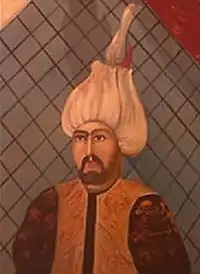 Sokollu Mehmed Pasha was an Ottoman statesman most notable for being the Grand Vizier of the Ottoman Empire.
Sokollu Mehmed Pasha was an Ottoman statesman most notable for being the Grand Vizier of the Ottoman Empire. Count Mikhail Miloradovich was prominent during the Napoleonic Wars and de facto ruled Russian Empire for a month.
Count Mikhail Miloradovich was prominent during the Napoleonic Wars and de facto ruled Russian Empire for a month.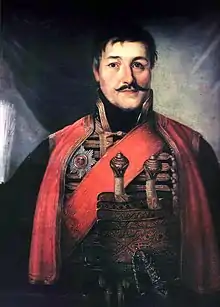 Karađorđe was a Serbian revolutionary and the founder of Karađorđević dynasty.
Karađorđe was a Serbian revolutionary and the founder of Karađorđević dynasty. Svetozar Boroević was an Austro-Hungarian field marshal who was described as one of the finest defensive strategists of the First World War.
Svetozar Boroević was an Austro-Hungarian field marshal who was described as one of the finest defensive strategists of the First World War. Živojin Mišić was a Field Marshal who participated in all of Serbia's wars from 1876 to 1918.
Živojin Mišić was a Field Marshal who participated in all of Serbia's wars from 1876 to 1918. Koča Popović was one of the leaders of Yugoslav partisans and Chief of the General Staff of the Yugoslav People's Army and Foreign Minister.
Koča Popović was one of the leaders of Yugoslav partisans and Chief of the General Staff of the Yugoslav People's Army and Foreign Minister.
Religion
Heads of the Serbian Orthodox Church
- Patriarchs
- Saint Sava (1174–1236)
- Saint Arsenije I Sremac (1233–1263)
- Saint Sava II (1263–1271)
- Archbishop Danilo I (1271–1272)
- Joanikije I (1272–1276)
- Saint Jevstatije I (1279–1286)
- Saint Jakov (1286–1292)
- Saint Jevstatije II (1292–1309)
- Saint Sava III (1309–1316)
- Saint Nikodim I (1316–1324)
- Saint Danilo II (1324–1337)
- Saint Joanikije II, (1338–1345) and as first Serbian patriarch (1346–1354)
- Patriarch Sava IV (1354–1375)
- Jefrem (1375–1380) and (1389–1390)
- Spiridon (1380–11 August 1389)
- Danilo III (1390–1396)
- Patriarch Arsenije III Crnojević (1672–1690)[30]
- Patriarch Kalinik I (1691–1710)
- Patriarch Arsenije IV Jovanović Šakabenta (1726–1737)
- Serbian Patriarch Joanikije III (1739–1746)
- Patriarch Kalinik II (1765–1766)
- Serbian Patriarch Dimitrije (1920–1930)
- Serbian Patriarch Varnava (1930–1937)
- Serbian Patriarch Gavrilo V (1838–1950)
- Serbian Patriarch Vikentije II (1950–1958)
- Serbian Patriarch German (1958–1990)
- Serbian Patriarch Pavle (1990–2009)
- Serbian Patriarch Irinej (2010–20??)
- Patriarch Raphael I of Constantinople, Patriarch from 1475 to 1476
- Makarije Sokolović (d. 1574)
- Bishops
- Teodor of Vršac (16th century)
- Prince-bishop Danilo I Šćepčev Petrović-Njegoš (1679–1737)
- Prince-bishop Sava II Petrović-Njegoš (1737–1782)
- Prince-bishop Vasilije III Petrović-Njegoš (1744–1766)
- Stefan Stratimirović[35] (1757–1836)
- Prince-bishop Petar I Petrović-Njegoš (Saint Peter of Cetinje), Bishop of Cetinje and Prince-Bishop of Montenegro 1782–1830[35]
- Sava II Branković (1815–1883)
- Ilarion Roganović (1828–1882)
- Prince-bishop Petar II Petrović-Njegoš (1830–1851)[35]
- Mitrofan Ban (1841–1920), Exarch, receiver of the Obilić medal
- Dositej Vasić (1878–1945)
- Nikolaj Velimirović (1880–1956)
- Amfilohije Radović (1938–2020)
- Georgije Đokić (1949)
- Longin Krčo (1955)
- Mitrofan Kodić (1951)
- Joanikije Mićović (1959)
- Porfirije Perić (1961)
- Jovan Ćulibrk (1965)
- Jovan Vraniškovski (1966)
- Grigorije Durić (1966)
Theologians
- Vikentije Ljuština (1761–1805)
- Josif Rajačić[35] (1785–1861)
- Nikodim Milaš (1845–1915)
- Nikolaj Velimirović (1881–1965)
- Justin Popović (1894–1979)
- Saint Varnava Nastić (1914–1964)
- Veselin Kesich (1921–2012)
- Amfilohije Radović (1938–2020)
Saints and blessed
- Saint Jovan Vladimir (c. 990–2016)
- Saint Lazar of Serbia[30] (1329–1389)
- Osanna of Cattaro (1493–1565), Roman Catholic nun and Saint who converted from Serbian Orthodoxy
- Stefan Stiljanovic (1498–1543)
- Saint Angelina (died 1520), despotess consort of Stephen Branković
- Saint Basil of Ostrog (1610–1671), Bishop of Zahumlje
- Sava II Branković (1615–1683)
- Stephen of Piperi (d. 1697)
- Theodor Komogovinski (18th century)
- Avakum (1794–1816)
- Petar Zimonjić (1866–1941)
- Saint Platon of Banja Luka (1874–1941)
- Saint Dionisije Milivojević (1898–1979)
- Saint Slobodan Šiljak (1881–1943)
- Branko Dobrosavljević (1888–1941)
- Saint Đorđe Bogić (1911–1941), parish priest of Našice, was tortured and slain by the Ustasha on the order of a Roman Catholic pries
 Saint Jovan Vladimir was the ruler of Duklja and the oldest Serb Saint.
Saint Jovan Vladimir was the ruler of Duklja and the oldest Serb Saint. Saint Sava was a Serbian prince and Orthodox monk, the first Archbishop of the autocephalous Serbian Church, the founder of Serbian law, and a diplomat.
Saint Sava was a Serbian prince and Orthodox monk, the first Archbishop of the autocephalous Serbian Church, the founder of Serbian law, and a diplomat.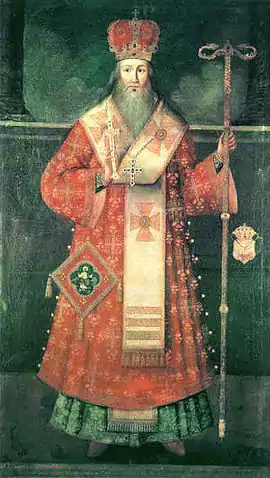
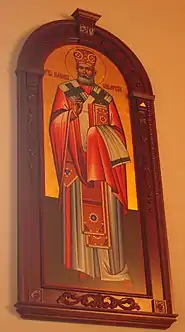 Platon of Banja Luka was an Eastern Orthodox bishop executed during the Genocide of Serbs.
Platon of Banja Luka was an Eastern Orthodox bishop executed during the Genocide of Serbs..JPG.webp) Nikolaj Velimirović was an influential theologian, writer and bishop of the Serbian Orthodox Church.
Nikolaj Velimirović was an influential theologian, writer and bishop of the Serbian Orthodox Church.
Other
Business entrepreneurs
- Jovo Kurtović (1718–1809)
- Miša Anastasijević (1803–1885)
- Sima Igumanov[35] (1804–1882)
- Nikola Spasić (1838–1916)
- Luka Ćelović (1854–1929)
- Vladimir Matijević (1854–1929)
- Milan Mandarić (1938)
- Miroslav Mišković (1945)
- Philip Zepter (1950)
- Bogoljub Karić (1954)
- Miodrag Kostić (1959)
Criminals
- Pink Panthers, jewel theft network
- Nikola Kavaja, (1932–2008)
- Vojislav Stanimirović (1937), organized crime
- Ratko Đokić (1940s–2003)
- Bosko Radonjich (1943–2011)
- Ranko Rubežić (1951–1985)
- Rade Kotur (1952)
- Arkan (1952–2000), warlord, organized crime
- Đorđe Božović (1955–1991)
- Dragan "Jokso" Joksović (1956–1998)
- Veselin Vukotić (1958)
- Goran Vuković (1959–1994)
- Mille Marković (1961–2014)
- Sreten Jocić (1962)
- Zvezdan Jovanović (1965), assassinated Serbian PM Zoran Đinđić
- Dušan Spasojević (1968–2003)
- Milorad Ulemek (1968), assassin of PM Zoran Đinđić and President Ivan Stambolić
- Kristijan Golubović (1969), organized crime
- Sretko Kalinić (1974)
- Mijailo Mijailović (1978), Swedish, assassin of Swedish Foreign Minister Anna Lindh
YouTubers
- Bogdan Ilić (born 1996), Rapper, gamer, actor & entertainer.
- Stefan Vuksanović (born 1998), Gamer & streamer.
References
- Ćeranić, Milica. "Svetozar Ivačković – problemi istraživanja". Leskovački zbornik 2007. Archived from the original on 26 August 2011. Retrieved 2 October 2010.
- "Живот је бајка – Константин Јовановић | Politikin Zabavnik". politikin-zabavnik.co.rs. Retrieved 2020-03-26.
- "Dimitrije T. Leko biography" (in Serbian). Retrieved 23 December 2017.
- "Momčilo Tapavica – atleta i arhitekta". ČASOPIS KUŠ!. 2020-02-19. Retrieved 2020-03-26.
- "Jelisaveta Načić – prva žena arhitekta u Srbiji". Blogovi o obrazovanju u XXI veku - (in Serbian). 2016-10-05. Retrieved 2020-03-26.
- Blagojevic, Ljiljana (2003). Modernism in Serbia: The Elusive Margins of Belgrade Architecture, 1919–1941. MIT Press. Dust jacket. ISBN 978-0-262-02537-9.
- Буквић, Димитрије. "Прва жена инжењер у Немачкој". Politika Online.
- "Milan Minić | Autori | Aukcijska Kuća Srbinovski". srbinovski-art.com. Retrieved 2020-03-26.
- "Сто двадесет пет година од рођења Александра Дерока". Politika Online. Retrieved 2020-03-26.
- "Nikola Dobrović". architectuul.com. Retrieved 2020-03-26.
- "Serbianunity.net". www.serbianunity.net. Archived from the original on December 3, 2008.
- "Arhitektura u Srbiji u XX veku" [Serbian architecture in XX century] (in Serbian). archive.is. Archived from the original on 13 July 2012. Retrieved 23 December 2017.
- "Alfa i omega arhitekture Energoprojekta – Žene u arhitekturi".
- "Protiv razaranja, rasizma i nacionalizma". Radio Slobodna Evropa (in Serbo-Croatian). Retrieved 2020-03-26.
- "The discipline of architecture and Freedom of spirit" (PDF) (in Serbian). 23 March 2006. Retrieved 23 December 2017.
- "Arhitekturni vodnik". www.arhitekturni-vodnik.org.
- "Ivanka Raspopović". architectuul.com.
- "Enigmatic Lady of Serbian Modernism – Women in Architecture".
- "Preminuo arhitekta Predrag Peđa Ristić". N1 Srbija (in Serbian). Retrieved 2020-11-06.
- "NIN / Odlazak Aleksandra Đokić". www.nin.co.rs.
- "Tri tačke oslonca: Zoran Bojović". msub.org.rs.
- Danas, Monografija o arhitekti Đorđu Tabakoviću Archived 2011-07-25 at the Wayback Machine Retrieved 23 December 2017
- "RETKI ZNAJU ZA TO! Ove dve osobe su zaslužne za to što su Delije i Grobari najglasniji navijači u Evropi! (FOTO) (VIDEO)". espreso.rs (in Serbian). Retrieved 2020-03-26.
- Astorino, Louis D. (2018-12-20). A Pencil in God's Hands: The Story of the Only American Architect to Design a Building in the Vatican. Dorrance Publishing. ISBN 978-1-4809-9990-9.
- Khemsurov, Monica (September 25, 2009). "Belgrade's Upgrade". The New York Times.
- "Assistant Professor Dubravka Sekulic | IZK". izk.tugraz.at.
- "Dubravka Sekulic". Akademie Schloss Solitude.
- "Ko su bili najveći vajari srpske umetnosti". Moj Nedeljnik. Retrieved 2020-03-26.
- "Poznati Banijci: Vajar Simeon Simo Roksandić". Banija Online (in Serbian). Retrieved 2020-03-26.
- srbija.gov.rs. "Знаменити Срби". www.srbija.gov.rs (in Serbian). Retrieved 2020-03-26.
- Jovanov, Jasna M. "Risto Stijović: Memories of people and events". Godišnjak Grada Beograda.
- "Spomenik Database | Profile for Vojin Bakić (Војин Бакић)". spomenikdatabase. Retrieved 2020-03-26.
- Fullerton, Elizabeth (2019-10-22). "Olga Jevrić". Sculpture. Retrieved 2020-06-14.
- "Neukrotiva mašta Džamonje". www.novosti.rs (in Serbian). Retrieved 2019-01-09.
- Znameniti srbi XIX. veka; (1800-1900); Urednik Andra Gavrilović: .... Godina (. Srpska Štamp. 1901.
- "Dragutin Inkiostri-Medenjak | artnet". www.artnet.com.
- "Pola veka Fis dizajna: Retrospektivna izložba Ljubomira Pavićevića Fisa". Museum of Applied Arts, Belgrade. Archived from the original on 2012-03-12. Retrieved 2011-06-27.
- "Biodata, Olja Ivanjicki". Archived from the original on July 1, 2009.
- "Srbija kao socijalni eksperiment". Nedeljnik Vreme. Retrieved 2020-06-06.
- "Viktor Mitic". Oeno Gallery. Retrieved 2020-06-06.
- "[Projekat Rastko] Branibor Debeljkovic, Dobitnik Godisnje nagrade za fotografiju (1969)". www.rastko.rs. Retrieved 2020-06-06.
- "ULUPUDS, Udruženje likovnih umetnika primenjenih umetnosti i dizajnera Srbije". www.ulupuds.org.rs. Retrieved 2020-06-06.
- https://www.worldpressphoto.org/people/srdjan-ilic
- BOOGIE, Fotografije (2016-05-31). "Bugijeve fotografije iz najozloglašenijih krajeva Jamajke". Vice (in Serbian). Retrieved 2020-06-06.
- "Goran Tomašević – prvi srpski foto-reporter s Pulicerovom nagradom za 42 magazin". 42 magazin. 2019-07-11. Retrieved 2020-06-06.
- "OTIŠLA KOD NJE Pogledajte kako izgleda ćerka Verice Rakočević koja živi u Njujorku i nije poznata javnosti". Blic.rs.
- "Srpsko Narodno Vijeće :: Josif Runjanin". snv.hr. Retrieved 2019-07-04.
- "Zašto je Dušan Šestić najveći svetski baksuz među kompozitorima". Blic.rs (in Serbian). Retrieved 2020-01-29.
- "Sindromi nacionalnog poremećaja". Nedeljnik Vreme. Retrieved 2019-07-04.
- "Kanada: Srpkinja nacionalno blago". www.novosti.rs (in Serbian). Retrieved 2019-07-04.
- Nikolic, Tanja. "Arias from the second floor". Gloria magazine.
- "Radmila Smiljanić - Biografija". ART mozaik (in Bosnian). 2018-07-25. Retrieved 2019-07-04.
- "Oliver Njego - Biografija". ART mozaik (in Bosnian). 2018-09-19. Retrieved 2019-07-04.
- "ЛАУРА ПАВЛОВИЋ | Српско народно позориште". www.snp.org.rs. Retrieved 2019-07-04.
- "Milena Kitic, Mezzo-Soprano". www.milenakitic.com. Retrieved 2019-07-04.
- Tanjug, Blic. "Plasido Domingo posle optužbi o seksualnom uznemiravanju: Neću više nastupati u Metropolitenu. Menja ga POZNATI SRPSKI BARITON". Blic.rs (in Serbian). Retrieved 2019-09-27.
- "Nikola Mijailović". Suzanin Izbor. Retrieved 2019-07-04.
- "David Bizic - Bio". davidbizic.instantencore.com. Retrieved 2019-07-04.
- "Recordingeq.com". www.recordingeq.com.
- "Marina Arsenijević: U svetu vas poštuju ako čuvate svoje poreklo". NOVOSTI (in Serbian). Retrieved 2021-01-01.
- Vladimir. "Jasna Popovic". Serbica Americana. Retrieved 2020-06-07.
- "Koliko toga stane u jedan ljudski glas". Nedeljnik Vreme. Retrieved 2020-06-07.
- "GORAN ŠEPA U OGLEDALU: Pjesma o ljubavi je pjesma mog života". Montenegro magazin (in Bosnian). 2018-07-08. Retrieved 2021-02-04.
- Vukovic, Sanja (2018-05-28). "KARL MALDEN – SRBIN KOJI JE DOBIO OSKARA". Fondacija Srpski legat (in Serbian). Retrieved 2019-04-10.
- Vladimir. "To Christ and the Church". Serbica Americana. Retrieved 2019-04-10.
- "JEDINA SRPSKA GLUMICA U SERIJALU "DŽEJMS BOND" Nađa je igrala u DVA HITA o tajnom agentu 007, a od njene priče ledi se KRV U ŽILAMA (VIDEO)". www.srbijadanas.com (in Serbo-Croatian). Retrieved 2019-06-21.
- "Beautiful Serbia". www.listal.com. Retrieved 2019-04-10.
- "Why Ralph Fiennes Got Honorary Serbian Citizenship". The Hollywood Reporter. Retrieved 2019-04-10.
- "Milena Govich Bio, Net Worth, Height, Weight, Boyfriend, Affair, Married, Ethnicity, Nationality, Fact & Career". ALLSTARBIO. 2017-08-14. Retrieved 2019-04-10.
- Mijatović, M. "I Srpkinja i Aboridžinka". Blic.rs (in Serbian). Retrieved 2019-04-10.
- "Archived copy". Archived from the original on 2010-10-22. Retrieved 2010-10-20.CS1 maint: archived copy as title (link)
- "Petar Benčina, jedan od najtraženijih pozorišnih glumaca | Sinemanija".
- "Petar Bencina". IMDb.
- Sretenović, Mirjana. "Tragična sudbina porodice Botorić". Politika Online. Retrieved 2020-05-27.
- "Drama olako upotrebljenih najtežih reči". Nedeljnik Vreme. Retrieved 2019-11-04.
- Serbia, RTS, Radio televizija Srbije, Radio Television of. "Milosavljević: Srpske podele od "Korena" do danas". www.rts.rs. Retrieved 2019-11-04.
- "Podrška Luksemburga za novi film Arsenijevića | SEEcult.org". www.seecult.org. Retrieved 2020-05-27.
- "Verica Rakočević: I kada je najgore, uvek dođe neki pljusak koji me osveži". www.novosti.rs.
- fr:Sacha Lakic
- "Archived copy". Archived from the original on 2017-12-25. Retrieved 2019-06-10.CS1 maint: archived copy as title (link)
- "Ana Sekularac news and features". British Vogue.
- "Ana Sekularac Collections - Ana Sekularac Runway Show Archive". ELLE.
- "Ana Ljubinković predstavila dve nove kolekcije: Modeli inspirisani starim razglednicama i ljubavnim pismima!". zena.
- "5 Serbian Designers to Know". March 5, 2018.
- "NEO Design: elegant dresses and futuristic silhouettes". Vogue.it. July 17, 2017.
- "Ivana Pilja: Modna pista je pozornica za dizajnera". Vijesti.me. October 25, 2015.
- "Ana Rajcevic | BTURN".
- "Five Emerging Fashion Capitals Worth Knowing". pastemagazine.com. May 30, 2017.
- "The Art of Glove Making". October 10, 2012.
- "Sara Brajovic – Vogue.it". www.vogue.it (in Italian). Retrieved 2019-04-10.
- arhiva, blic. "Dve Srpkinje za mis sveta". Blic.rs (in Serbian). Retrieved 2021-01-27.
- "Projekat Rastko: Istorija srpske kulture". www.rastko.rs. Retrieved 2020-03-26.
- http://www.joakimvujic.com/english.php Archived 2009-10-08 at the Wayback Machine Knjaževsko-srpski teatar
- "Da li znate ko je Rastko Petrović – Portalibris" (in Serbian). Retrieved 2020-03-26.
- Зорица Турјачанин, Свежањ нових кључева. Студије и есеји из књижевности за дјецу, Бања Лука 1999, pp. 71.
- Ibrahim Kajan, Zavođenje Muslimana. (Budi svoj!), Zagreb 1992, pp. 66}-: Вјерујте ми да све донедавно нисам ни знао да су Григор Витез, Драго Кекановић или мој драги пријатељ, покојни Момчило Попадић — Срби!
- "Grigor Vitez – dječji pjesnik". Srpsko Narodno Vijeće - SNV (in Croatian). Retrieved 2021-01-14.
- "Milovan Vitezović: Ima li većeg patriotizma od satirične književnosti". Nedeljnik. Retrieved 2020-04-15.
- "Перо Зубац - Биографије српских писаца". Суштина поетике (in Serbian). 2020-09-13. Retrieved 2021-01-11.
- "Stupar Trifunović: Ili ćemo mijenjati stvar ili ćemo se pokupiti svi i otići". Radio Slobodna Evropa (in Serbo-Croatian). Retrieved 2020-08-17.
- Phillips, Kaitlin (April 13, 2017). "In This Tale of Online Intimacy, the Only Wise Characters Are Luddites". The New York Times.
- Beckerman, Hannah; Clark, Alex; O'Keeffe, Alice; Kellaway, Kate; Sethi, Anita; Lewis, Tim; Parkinson, Hannah Jane; O'Kelly, Stephanie Cross Lisa (January 22, 2017). "Meet the new faces of fiction for 2017". The Guardian – via www.theguardian.com.
- "10 Most Famous Serbs in the World". www.serbia.com. Retrieved 2019-07-04.
- "Marija Maga Magazinović". knjizenstvo.etf.bg.ac.rs. Retrieved 2019-07-04.
- Aleksandra Bogdanović (2016-04-14). "Znate da je Andrić dobio Nobela, ali ovo su SRBI KOJI SU DOBILI PULICEROVU NAGRADU | Dnevno.rs". www.dnevno.rs (in Croatian). Retrieved 2019-07-04.
- David, H. A.; Edwards, A. W. F. (2013-06-29). Annotated Readings in the History of Statistics. Springer Science & Business Media. ISBN 978-1-4757-3500-0.
- Olson, Richard S. (2015-03-08). Scottish Philosophy and British Physics, 1740-1870: A Study in the Foundations of the Victorian Scientific Style. Princeton University Press. ISBN 978-1-4008-7249-7.
- Olson, Richard (1982). Science Deified & Science Defied: The Historical Significance of Science in Western Culture. University of California Press. ISBN 978-0-520-20167-5.
- Ball, Philip (2014-07-31). Critical Mass. Random House. ISBN 978-1-4481-8541-2.
- Levy, Joel (2016-09-29). The Infinite Tortoise: The Curious Thought Experiments of History's Great Thinkers. Michael O'Mara Books. ISBN 978-1-78243-638-6.
- Bulletin of Fukuoka University of Education. Part III, Natural sciences. Fukuoka Kyoiku Daigaku. 1981.
- The Publishers' Trade List Annual. R.R. Bowker Company. 1959.
- Persson, Anders (2005). Early operational Numerical Weather Prediction outside the USA: a historical introduction: Part II: Twenty countries around the world. Meteorological Applications (2005), 12: 269–289 Cambridge University Press.
- Gburčik, P. (1985) Climate Modelling and Forecasting of the Distribution of Air pollution in a Town with Complex Topography. Research Activities in Atmospheric and Oceanic Modelling, Report No. 8, WMO/TD – No. 63, WCRP, Geneva – pp. 8.12–8.13.
- "Serbian Americans: History—Culture—Press". Serbica Americana.
- "Jasmina L. Vujic | Research UC Berkeley". vcresearch.berkeley.edu.
- "Ljubinka Nikolic". Mars One Community Platform.
- "MOJOJ SRBIJI DARUJEM 70 UDžBENIKA: Aleksandar Kavčić, profesor na Karnegi Melon univerzitetu u SAD, zalaže se za potpuno besplatno obrazovanje". NOVOSTI (in Serbian). Retrieved 2021-01-25.
- "International Mathematical Olympiad Hall of Fame 2012". Imo-official.org. Retrieved 23 December 2017.
- "Serbian youth world's best young mathematician". B92. 16 July 2012. Retrieved 23 December 2017.
- "Gojko Lalic - UW Dept of Chemistry". depts.washington.edu.
- "Gordana Lazarevich". Encyclopedia of Music in Canada. Retrieved September 9, 2019.
- "MAČVU I BUDAN SANjA". Glas Podrinja (in Serbian). Retrieved 2020-02-02.
- Martinović, Valtazar Bogišić i ujedinjena omladina sprska, ZMS 9 (1954), 26
- "Radovan Kovacevic". Southern Methodist University. Archived from the original on 2012-04-15.
- "NASA - First Meeting". Nasa.gov. Retrieved 2012-12-27.
- "Šest srpskih košarkaša među 25 najboljih Evropskih igrača!". alo.
- "Igrači izabrali: Dražen najbolji svih vremena". www.novosti.rs.
- Kovačević, Antonije. "INTERVJU, GORAN DRAGIĆ, NBA ZVEZDA: Slavim Božić po pravoslavnim običajima, moja žena mesi pogaču a posle toga će i kolač za našu slavu, Svetog Jovana | Serbiantimes.info". Retrieved 2021-01-11.
- "Najbolji srpski košarkaš SVIH VREMENA? Nikola je odabrao!". Mondo Portal (in Serbian). Retrieved 2021-01-12.
- Coppack, Nick (17 September 2010). "Vidic retains armband". ManUtd.com. Manchester United. Retrieved 23 December 2017.
- "Olimpijski komitet Srbije proglasio najbolje sportiste u 2016. godini".
- ""MOJA KRV JE SRPSKA" MMA fajter odlukom ODUŠEVIO, Rakić promenio zastavu i Srbija će imati prvog borca za UFC pojas". Blic.rs (in Serbian). Retrieved 2020-11-08.
- "Bogić Bogićević, čovjek koji je Miloševićevoj politici rekao historijsko NE". Al Jazeera Balkans (in Bosnian). 2020-11-20. Retrieved 2020-11-26.
- Zulfikarpašić, Adil (1998). The Bosniak. Milovan Djilas. C. Hurst & Co. Publishers. p. 7. ISBN 1-85065-339-9.
- Stavrides 2001.
- Lowry, Heath W. (2003). The Nature of the Early Ottoman State. SUNY Press. p. 116. ISBN 978-0-7914-8726-6. Retrieved 20 February 2013.
- "Sultan II. Süleyman Han". Republic of Turkey Ministry of Culture and Tourism. Retrieved 2009-02-06.
- İnal, Günseli; Arşivi, Semiramis (2005). Semiramis: Sultan'ın gözünden şenlik. YKY. p. 27. ISBN 978-975-08-0928-6.
Siileyman'in annesi Sirp Katrin yani Dilasiip Hatun
- Ali Kemal Meram (1977). Padişah anaları: resimli belgesel tarih romanı. Öz Yayınları. p. 325.
- Meram 1977, p. 355, "İkinci Mustafa'nın (Şehsuvar Sultan) takma adlı câriyesi Sırp kızı Mari'den doğan oğlu Üçüncü Osman", İnal & Arşivi 2005, p. 27, "Osman'in annesi Sirp Mari yani §ehsiivar Sultan"
- Bosanska vila. Nikola T. Kašiković. 1898. p. 301.
- Vukićević, Milenko M. (1906). Znameniti Srbi muslomani. Davidović. p. 104.
Кућа Сијерчића води своје поријекло од старе српске властеоске куће Шијернића, како запнси тврде, или од Лучевпћа, како предање каже. Кад је сила османлијска навалила на Босну п Херцеговину, онда се кућа Шијернића храбро бо- рила протпв снле османлијске, борила се бранећи јуначкн своје огњиште и свој народ, свој језнк и своју слободу. Алп ко ће силн ...
- Finkel 2012, p. 21.
- Gemil, Tahsin (1991). Românii și otomanii în secolele XIV-XVI (in Romanian). p. 59. ISBN 9789732701980.
Malkocogullari, tot comandanţi de acingii, erau descendenţii unui feudal sirb Malkovic).
Sources
- Ćirković, Sima (2004). The Serbs. Malden: Blackwell Publishing.
- Cox, John K. (2002). The History of Serbia. Westport, Connecticut: Greenwood Press.
- Finkel, Caroline (2012). Osman's dream: the story of the Ottoman Empire, 1300-1923. ISBN 9780465008506.
- İnal, Günseli; Arşivi, Semiramis (2005). Semiramis: Sultan'ın gözünden şenlik. YKY. ISBN 978-975-08-0928-6.
- Meram, Ali Kemal (1977). Padişah anaları: resimli belgesel tarih romanı (in Turkish). Öz Yayınları.
- Pavlowitch, Stevan K. (2002). Serbia: The History behind the Name. London: Hurst & Company.
- Radojević, Mira; Dimić, Ljubodrag (2014). Serbia in the Great War 1914-1918: A short History. Belgrade: Srpska književna zadruga, Belgrade forum for the world of equals.
- Stavrides, Théoharis (2001). The Sultan of Vezirs: The Life and Times of the Ottoman Grand Vezir Mahmud Pasha Angelovic (1453–1474). Brill. ISBN 978-90-04-12106-5.
This article is issued from Wikipedia. The text is licensed under Creative Commons - Attribution - Sharealike. Additional terms may apply for the media files.

